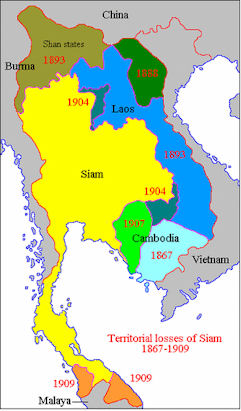

Zitierweise / cite as:
Payer, Alois <1944 - >: Chronik Thailands = กาลานุกรมสยามประเทศไทย. -- Chronik B. E. 2475 / 1932-04 - 1933-03. -- Fassung vom 2016-11-28. -- URL: http://www.payer.de/thailandchronik/chronik1932-33.htm
Erstmals publiziert: 2013-05-17
Überarbeitungen: 2016-11-28 [Ergänzungen] ; 2016-10-31 [Ergänzungen] ; 2016-03-25 [Ergänzungen] ; 2016-02-23 [Ergänzungen] ; 2016-01-05 [Ergänzungen] ; 2015-12-23 [Ergänzungen] ; 2015-11-11 [Ergänzungen] ; 2015-11-02 [Ergänzungen] ; 2015-10-21 [Ergänzungen] ; 2015-09-23 [Ergänzungen] ; 2015-07-08 [Ergänzungen] ; 2015-06-07 [Ergänzungen] ; 2015-06-01 [Ergänzungen] ; 2015-05-27 [Ergänzungen] ; 2015-05-21 [Ergänzungen] ; 2015-02-13 [Ergänzungen] ; 2015-01-27 [Ergänzungen] ; 2014-11-25 [Ergänzungen] ; 2014-10-18 [Ergänzungen] ; 2014-08-27 [Ergänzungen] ; 2014-03-31 [Ergänzungen] ; 2014-03-03 [Ergänzungen] ; 2014-01-02 [Ergänzungen] ; 2013-12-20 [Ergänzungen] ; 2013-12-06 [Ergänzungen] ; 2013-11-12 [Ergänzungen] ; 2013-09-29 [Ergänzungen] ; 2013-06-04 [Ergänzungen]
©opyright: Dieser Text steht der Allgemeinheit zur Verfügung. Eine Verwertung in Publikationen, die über übliche Zitate hinausgeht, bedarf der ausdrücklichen Genehmigung des Herausgebers.
Dieser Text ist Teil der Abteilung
Thailand von
Tüpfli's Global Village Library
ช้างตายทั้งตัวเอาใบบัวปิดไม่มิด
|
Gewidmet meiner lieben Frau
die seit unserem ersten Besuch in Thailand 1974 mit mir die Liebe zu den und die Sorge um die Bewohner Thailands teilt. |
|
Bei thailändischen Statistiken muss man mit allen Fehlerquellen rechnen, die in folgendem Werk beschrieben sind:
Die Statistikdiagramme geben also meistens eher qualitative als korrekte quantitative Beziehungen wieder.
|
|
Rama I soll prophezeit haben, dass seine Dynastie nur 150 Jahre (bis 1932) Bestand haben wird. |
1929/1930 - 1932/1933
Staatseinnahmen
Abb.: Staatseinnahmen 1929/30 - 1932/33 (in Mio. Baht)
[Datenquelle: Thompson, Virginia <1903 - 1990>: Thailand the new Siam. -- New York : Macmillan, 1941. -- S. 553]Das Haushaltsjahr 1932/33 endet mit einem Defizit von 10 Mio. Baht.
1892 - 1949
Ausgaben für Militär, Bildung und Königshaus in Prozent der gesamten Staatsausgaben:
Abb.: Ausgaben für Militär, Bildung und Königshaus in Prozent der gesamten Staatsausgaben 1892 - 1949
[Datenquelle: Ingram (1971), S. 102]Staatsausgaben fürs Königshaus in Mio. Baht:
Abb.: Staatsausgaben fürs Königshaus in Mio. Baht, 1892 - 1949
[Datenquelle: Ingram (1971), S. 102]
1932
Schätzungsweise 58% der schulpflichtigen Kinder besuchen tatsächlich eine Schule.
1932
Kosten der Schulen pro Schüler
- Dorfschule: 3,21 Baht pro Jahr
- Regierungsschule: 32 Baht pro Jahr
Durchschnittliches Monatsgehalt eines Lehrers
- Dorfschule: 14,44 Baht
- Regierungsschule: 56,47 Baht
1932

Die zehn protestantischen Missionsschulen haben 3.729 Schüler. Die Schulabgangsfeier heißt bei den Schülern: "Good-by Jesus Day".
1922 - 1932
Behinderte und ansteckend kranke Kinder im schulpflichtigen Alter
Abb.: Statistisch erfasste kranke und behinderte Kinder zwischen 7 und 14, Durchschnitt pro Jahr, 1922 bis 1932
[Datenquelle: Manich Jumsai [มานิจ ชุมสาย] <1908 - 2009>: Compulsory education in Thailand. -- Paris : UNESCO, 1951. -- 110 S. ; 22 cm. -- (Studies in compulsory education ; VIII). -- S. 43]
1932
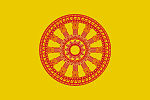
In Siam gibt es 6 chinesische buddhistische Klöster.
1932
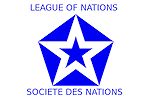
Im Jahr 1932 leistet Siam den größten seiner finanziellen Beiträge zum Völkerbund: 300.000 Schweizer Franken.
1932 - 1935-11

Der Brite James Baxter (1896 - ) ist Finanzberater der Regierung Siams.
1932

In Siam sind schätzungsweise 20 Mio. britische Pfund an britischen Investitionen und Anleihen.
1913 / 1932
Nationalität der im Hafen von Bangkok eingelaufenen Dampfschiffe:
Abb.: Nationalität der im Hafen von Bangkok eingelaufenen Dampfschiffe 1913 und 1932
[Datenquelle: Credner (1935), S. 322]
1932
Verwaltungsreform: Reduktion der Monthon (มณฑล) von 14 auf 10 und der Provinzen (จังหวัด) von 79 auf 70. Es gibt 406 Amphoe (อำเภอ). Die Provinzen werden von einem Komitee aus Amphoe-Leitern und den Vorsitzenden der lokalen Dienste unter einem Provinz-Kommissar verwaltet.
1932
Eine Reihe von Feuersbrünsten in Bangkok (Versicherungswert 2 Mio. Baht) führen dazu, dass erstmals Bauvorschriften erlassen werden.
1932
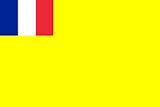
Auf der Grundlage des Zolltarifs Indochinas von 1928 werden entlang des Mekong (ແມ່ນ້ຳຂອງ / แม่น้ำโขง / មេគង្គ) Zollstationen eingerichtet: Ende des Freihandels mit Laos.
1932
Bildung des Royal Thai Marine Corps (นาวิกโยธินแห่งราชอาณาจักรไทย) der Marines der Thai-Marine (กองทัพเรือ).
Abb.: Royal Thai Marine Corps (นาวิกโยธินแห่งราชอาณาจักรไทย) bei der Kremation der Mutter des Königs, 2008
[Bildquelle: Xiengyod / Wikipedia. -- GNU FDLicense]
"The Royal Thai Marine Corps (Thai: นาวิกโยธินแห่งราชอาณาจักรไทย) are the marines of the Royal Thai Navy (กองทัพเรือ), the corps was founded in 1932 when the first battalion was formed with the assistance of the USMC (United States Marine Corps). It expanded to a regiment in 1940 and was in action against communist guerrillas throughout the 1950s and 1960s. During the 1960s the USMC again helped with expansion to a brigade. The RTMC saw further action on the Malaysian border in the 1970s, where it then expanded two brigades. History
According to Thai military history, the "Thahan Ma-Rine", or "Marine Soldiers" were established in 1833 during the reign of King Rama the Third. The word "Ma-Rine" is a direct translation of the English word, "Marine". The development of the Marine Corps can be divided into three periods:
Former AgeThe Marine Corps, or Marine Soldiers, in the former age were mostly a Royal Honor Guard and involved with the security of the King when he travelled around the country.
On March 2, 1913, the Ministry of the Navy set up a new unit that caused the Marines to be organized as follows:
- The Marine Canon Platoon was moved to be attached to the Operation Command Department of Ships and Fortresses.
- The Marine Soldiers Infantry Platoon in Bangkok was moved to be attached to the Vehicle Division which was in control of the Department of the Navy Amphibious Assault Group.
The vehicle division played a very important role because Marines were included in this battalion. The Revolution in 1932 replaced Thailand's absolute monarchy with a democratic regime which also caused a reorganization of the Navy. As part of this reorganization, the vehicle battalion became the Marine Corps Battalion under the Bangkok Navy Station. This Battalion is reguarded as the first Marine Corps Battalion in Thailand.
Post Revolution (1932 - 1955)In the year 1937, the 2nd Marine Corps Battalion was set up at Sattahip (สัตหีบ). This unit was responsible for setting up the main Marine Corps Department at Sattahip in 1939. Until 1940, there was a dispute along the eastern border of Thailand with French Indo-China. The Marine Corps Department "Chanthaburi Division" fought several times along this border region. During World War II, the Marine Corps fought in Chonburi Province (ชลบุรี) and sent troops to protect the Malayu State Region in the South of Thailand and also Phuket Province (ภูเก็ต).
After WWII ended, the Marines were used to help disarm the Japanese Army at Ban Pong District (บ้านโป่ง) in Ratchaburi Province (ราชบุรี ). In 1950 when there was an uprising in the South of Thailand, Marine Corps Troop 6 was sent to help restore the peace in Narathiwat Province (นราธิวาส).
On June 29, 1951, the government disbanded the Marine Corps Bureau and scattered the Marines into other departments for four years. During that time, the Cold War between Western Democracies and Eastern Communist Nations started to grow and become a more serious concern. Luckily, the Thai Marine Corps were supported by both the United States Military and also the Royal Thai Navy.
New Age (1955 - present)As the Cold War progressed, the Thai Government and Royal Thai Navy realized the important role of the Thai Marine Corps and reestablished the Marine Corps Department on July 30, 1955 and started a new era for the Marines. In 1961, tensions flared over Preah Vihear Temple (ប្រាសាទព្រះវិហារ) on the Cambodian border. This tension along the Chanthaburi (จันทบุรี) and Trat (ตราด) borders with Cambodia gave the Marine Corps one of their first assignments. Since 1970, the Chanthaburi-Trat Task Force has been officially protecting this area along the Cambodian border.
From 1972 to 1973, the Marines were involved in the "Sam-Chai" anti-communist operations in Phetchabun Province (เพชรบูรณ์) and the "Pha-Phum" anti-communist operations in Chiang Rai Province (เชียงราย). From 1973 to 1974, the Marines were involved in anti-communist operations in the southern provinces of Pattani (ปัตตานี)), Yala (ยะลา) and Narathiwat (นราธิวาส).
Since the year 1975, Marines have been working in Narathiwat from then till now by setting up the special forces marine corps in the South for suppressing the communists. In 1977, the Marines captured the communist camp at Krung-Ching in Nakhon Si Thammarat Province (นครศรีธรรมราช) and stayed there until pulling back in 1981.
The Royal Thai Navy has also sent the Marines to help in suppressing the many violent demonstrations and coups in Bangkok. The Marines are still responsible for border security in Chanthaburi and Trat provinces. They have also fought in the battles of Baan Hard Lek, Baan Koat Sai, Baan Nhong Kok, Baan Kradook Chang, Baan Chumrark and also in the North East Region in the battle of Hard Don Nai in Nakhon Phanom Province (นครพนม).
Many Thai Marines have died in past wars and continue to be wounded and killed in active service today. In Sattahip, the Marine Corps has built a monument to all Marines as a memorial to those who have died bravely in battle as Royal Thai Marines."
[Quelle: http://en.wikipedia.org/wiki/Royal_Thai_Marine_Corps. -- Zugriff am 2012-02-27]
1932
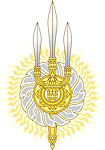
Prinz Bhumibol, der künftige Rama IX., besucht in Bangkok die katholische, von Ursulinen geführte Schule Mater Dei (โรงเรียนมาแตร์เดอีวิทยาลัย). Seine Lehrerin ist Schwester Marie Xavier (geborene Ana Pierc, gest. 1987) aus Slowenien.
1932
Erstmals wird das Schulgesetz von 1919 konsequent angewendet: auch in chinesischen Schulen muss wöchentlich mindestens 25 Stunden in siamesischer Sprache unterrichtet werden. Chinesische Lehrer müssen ein Sprachprüfung in Siamesisch bestehen.
1932
Die Siam Society (สยามสมาคม) bezieht ein eigenes Gebäude am Soi Asoke (สุขุมวิท ซอย 21 = ถนนอโศกมนตรี) in Bangkok
Abb.: Gebäude der Siam Society (สยามสมาคม), 1932
Abb.: Lage der Siam Society (สยามสมาคม)
[Bildquelle: OpenStreetMap. -- Creative Commons Lizenz (Namensnennung, share alike)]
nach 1932
คุณ (khun) wird als höfliche Anrede für alle Erwachsenen gebräuchlich
"The current use of this word as the polite title of address to anyone arose after 1932. Prior to that time it had been used as a deferential title of address for non-titled offspring of nobles of the rank phrájaa [พระยา] or higher, those of lower state being addressed as phôo [พ่อ] (father), ?âaj [อ้าย] (older brother), mêe [แม่] (mother) or ?amdeeŋ [อำแดง] (any woman). The present king has now established this same khun as a title which can be conferred on women as a mark of favor. Verbally it is indistinguishable from the ordinary polite title of address, but is distinguished in writing on such occasions as the recipient may be required to to provide complete identification, where ordinary persons might give only their names. Also the recipient may be referred to in print with the title khun, whereas ordinary persons would be referred to naaŋ [นาง] (as untitled men are referred to as naaj [นาย])." [Quelle: Jones, Robert B. <1920 - > ; Mendiones, Ruchira Chinnapongse [รุจิรา ชินณพงศ์ เมนเดียนส์] <1918 - >: Thai cultural reader = ประมวลความเรียงเบ็ดเตล็ค. -- Ithca, NY : Cornell Univ. Southeast Asia Program. -- Book II. -- 1969. -- 791 S. -- S. 625f. -- Copyright bis 1978/1979, danach public domain]
1932
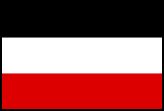
Bangkok: Gründung der "Deutsch-Siamesische Medizinisch-Naturwissenschaftliche Gesellschaft". Ihr Ziel ist, das Interesse der Siamesen für das Medizinstudium in Deutschland.
1932, Herbst
Die Reisernte ist außerordentlich gut. Der Resipreis fällt während des ganzen Jahrs 1932/33 und die Einkommen der bauern fallen auf die Hälfte des Durchschnitts der vier vorausgegangenen Jahre..
1932, Ende
Fertigstellung der Drainagen Chiang Rak (เชียงราก) und Bang Hia (บางเหี้ย, jetzt: Bang Bo - บางบ่อ). IN Bang Hia wurde ein 52 langer Deich entlang der Küste gebaut, der die Überschwemmungen durch Springfluten zurückhalten soll.
Die gesamte so bewäserte Fläche ist ca. 5400 km², Kosten: ca. 9 Mio. Baht.
Abb.: Lage von Chiang Rak (เชียงราก)
[Bildquelle: OpenStreetMap. -- Creative Commons Lizenz (Namensnennung, share alike)]
Abb.: Lage von Bang Hia (บางเหี้ย, jetzt: Bang Bo - บางบ่อ)
[Bildquelle: OpenStreetMap. -- Creative Commons Lizenz (Namensnennung, share alike)]
1932
Es erscheint:
วิจิตรวาทการ [Wichitwathakan] <1898 - 1962>: การเมือง : การปกครองของกรุงสยาม [Politik : die Verwaltung Siams]. -- กรุงเทพฯ : ไทยใหม่, 2475 [= 1932]. -- 256 S. ; 19 cm
Abb.: Einbandtitel
"Selbst heute gibt es Leute, die die Bedeutung von Recht und Freiheit sehr falsch verstehen. Und dieses Missverständnis nimmt eine unerwünschte Richtung an, nämlich Freiheit und Recht scheinen so interpretiert zu werden, als könne man Gewalttätigkeiten gegen Personen richten, die Moral verfallen lassen und ein faules Leben führen. Das Wort 'Phra Si An' (Siri Ariya) in der ersten Proklamation der Volkspartei und die Vorstellung, gewaltige Geldmengen würden bei den Prinzen enteignet, werden sich für die Volkspartei in vielfältiger Weise rächen." [a.a.O., S. 164. -- Übersetzung: Skrobanek, Walter <1941 - 2006>: Buddhistische Politik in Thailand : mit besonderer Berücksichtigung des heterodoxen Messianismus. -- Wiesbaden : Steiner, 1976. -- 315 S. ; 24 cm. -- (Beiträge zur Südasienforschung ; 23). -- ISBN 3-515-02390-9. -- Zugl.: Heidelberg, Univ., Diss., 1972. -- S. 68. -- Mit Erlaubnis des inzwischen verstorbenen Autors]
1932

Es erscheint:
[Le May, Reginald <1885 - 1972>:] The economic condition of north-eastern Siam. -- Bangkok : Ministry of Commerce and Communications, 1932. -- 172 S. : Ill. ; 24 cm
1932

Es erscheint:
Chote Khumbhan [โชติ คุ้มผล ?] <1899 - >: Siams wirtschaftlicher Aufbau, Außenhandel und Zahlungsbilanz. -- Leipzig : Verl. Anst. d. Leipziger Meßamts in Komm., 1932. -- 95 S. -- Univ. Leipzig, Phil. Diss.
1932

Es erscheint:
Seelig, Paul J. (Paul Johan) <1876 - 1945>: Siamesische Musik = Siamese music. -- Bandoeng : Matatani, 1932. -- 151 S. : Noten ; 31 cm. -- "Melodien und Tonstücke ; übertragen in europäische Notenschrift"
1932

Es erscheint:
Trittel, Walter <1880 - 1948>: Siamesisch-deutsches Wörterverzeichnis juristischer Fachausdrücke. -- In: Mitteilungen des Seminars für Orientalische Sprachen zu Berlin. -- Jg. 35, Abt. 1 (1932). -- S. 136 - 211
1932

Es erscheint:
Yasser, Joseph <1893–1981>: A theory of evolving tonality. -- New York : American library of musicology, 1932. -- 381 S. : Ill. ; 23 cm. -- Das siamesische Tonsystem wird im ganzen Buch als Beispiel genannt.
1932
Es läuft an der Tonfilm "Long Thang" (หลงทาง, Gone Astray).
Abb.: Szenenbild
[Bildquelle: Barmé (2002), S. 212]
1932
Beginn der Synchronisation fremdsprachiger Filme in Thai.
1932
Es erscheint:พ.เนตรรังษี [= พัฒน์ เนตรรังษี] [P. Netrangsi] <1906 - >: เด็กบ้านสวน (Das Kind vom Lande). -- Eine ländliche Idylle
Abb.: Einbandtitel einer modernen Ausgabe
1932
Es erscheint:
The chronicle of the Emerald Buddha / translation by Camille Notton, consul of France. -- Bangkok : Bangkok Times, 1932. -- 52 S.
1932

Es erscheint
Freeman, Andrew A. <1900 - >: Brown women and white. -- New York : John Day, 1932. -- 341 S. : Ill. -- 22 cm
Abb.: Titelblatt
Abb.: Frontispiece / von F. L. Amberger
1932
Gründung der Young Men Christian Association Bangkok (มูลนิธิ ไว.เอ็ม.ซี.เอ. กรุงเทพฯ).
Abb.: ®Logo
1929- 1932

ca. 85% von Japans Reisimporten kommen aus Siam.
1932

Abb.: Von der Natur zur Kunst im Brückenbau: Uralte verdeckte Holzbrücke in Siam
[Quelle: Palmin-Post-sammelbild, 1932]
1932
Es erscheint der Roman:
กุหลาบ สายประดิษฐ์ [Kulap Saipradit, aka. Sriburapha - ศรีบูรพา] <1905 - 1974>: สงครามชีวิต [Krieg des Lebens]. -- Adaption von Dostowjeskis (Фёдор Миха́йлович Достое́вский, 1821 - 1881) "Arme Leute" (Бедные люди, 1846), in thailändische Milieu versetzt. Vorläufer der sozialkritischen Literatur: die beiden Liebenden gehören der armen Bevölkerungen an.
Abb.: Umschlagtitel einer späteren Ausgabe
Abb.: Einbandtitel einer Ausgabe 1993Zitat:
"Zum tham bun [ทำบุญ] durch jedes Mal reichliche Speisung von Mönchen, wobei man einen großen Geldbetrag verschwenden muß - dazu bin ich ... nicht in der Lage. Wenn solche Speisung von Mönchen die Hauptursache dafür ist, daß wir in den Himmel kommen, dann habe ich natürlich keine Hoffnung .. ." [Übersetzt von: Rosenberg, Klaus <1943 - 1988>: Sozialkritische Literatur in Thailand : Protest und Anklage in Romanen und Kurzgeschichten eines Landes der Dritten Welt. -- Hamburg : Ges. für Natur- u. Völkerkunde Ostasiens, 1986. -- 360 S. ; 21 cm. -- (Gesellschaft für Natur- und Völkerkunde Ostasiens: Mitteilungen der Gesellschaft für Natur- und Völkerkunde Ostasiens e.V. Hamburg ; Bd. 101). -- S. 301]
1932
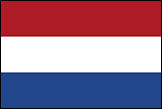
Es erscheint:
Seelig, Paul Johan <1876-1945>: Siamesische Musik. -- Bandoeng : Matatani, 1932.
1932

Die US-Firma DuPont bringt den synthetischen Chloropren-Kautschuk unter dem Namen Duprene (ab 1938 Neoprene) auf den Markt. Neoprene wird Naturkautschuk im Automobilbau teilweise verdrängen für "Schläuche, Kabelummantelungen, extrudierte Profile, Dichtungen und Antriebsriemen" (Wikipedia).
1933, Frühjahr
Als Arbeitsbeschaffungsmaßnahme baut der Staat eine Straße von Paknam (ปากน้ำ = Samut Prakan - สมุทรปราการ) nach Bang Sue (บางซื่อ). Dadurch bekommen 1200 Personen Arbeit.
Abb.: Lage von Paknam (ปากน้ำ = Samut Prakan - สมุทรปราการ) und Bang Sue (บางซื่อ)
[Bildquelle: OpenStreetMap. -- Creative Commons Lizenz (Namensnennung, share alike)]
1933, Frühjahr
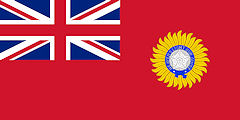
Der in Madras (= Chennai, Indien) wohnhafte Journalist Dr. Lanka Sundaram besucht Siam. Er berichtet daraufhin in verschiedenen Zeitungen Malayas und Indiens über Misshandlungen an indischen Arbeitern in Siam. Daraufhin wird K.A. Mukenden, der Vertreter Britisch Indiens in Malaya nach Siam geschickt, um die Vorwürfe zu untersuchen.. Nach zehntägiger Untersuchung kommt er zum Schluss, dass die Inder in Siam ernsthafte Probleme haben. Während der vorangehenden fünf Jahre waren 9.000 Inder nach Siam gekommen und 6.100 nach Indien zurückgekehrt. Im Unterschied zu den Immigranten aus Malaya besteht der Großteil der Inder nicht aus ungelernten Hilfsarbeitern. Von den 1.834 Indern, die 1931 eingewandert waren, sind nur 33 Kulis, die große Mehrheit sind im Handel tätig. Die Inder, besonders die Sikhs, sind in Siam (und Thailand) sehr unbeliebt. Es gibt das Thai-Sprichwort: "Triffst du auf einen Inder und eine Kobra, töte den Inder".
1933
Vollendung des Sikh-Tempels "Gurdwara Siri Guru Singh Sabha" (คุรุดวาราศรีคุรุสิงห์สภา) in Bangkok. Kosten: Grundstück 16.000 Baht, Baukosten 25.000 Baht (andere Quellen sprechen von Gesamtkosten von 80.000 Baht).
Abb.: Lage des "Gurdwara Siri Guru Singh Sabha" (คุรุดวาราศรีคุรุสิงห์สภา)
[Bildquelle: OpenStreetMap. -- Creative Commons Lizenz (Namensnennung, share alike)]
Abb.: Gurdwara Siri Guru Singh Sabha (คุรุดวาราศรีคุรุสิงห์สภา) (nach der Erweiterung 1981), Bangkok, 2011
[Bildquelle: Sébastien Bertrand. -- http://www.flickr.com/photos/33195821@N00/6646974631. -- Zugriff am 2013-11-25. -- Creative Commons Lizenz (Namensnennung)]
1932-04 - 1938-03
Staatliche Ausgaben für Militär und Erziehung:
Abb.: Ausgaben für Militär und Erziehung, 1932-04 - 1938-03
[Datenquelle: Landon (1939), S. 54f.]
1932-04
Alle Einkommen über 600 Baht pro Jahr werden besteuert. Die Progression geht von 1% bis 20% (bei Jahreseinkommen über 34.600 Baht). Man wagt aber nicht die wirklich Reichen, die Adeligen und die chinesischen Händler, angemessen mit Steuern zu belasten. Ebenfalls besteuert werden Häuser und bestimmte Formen von Grundbesitz.
"The new taxation did not cause the revolution - the civil service in Siam was too accustomed to obeying orders blindly ; but it laid a ground-work of discontent that made the revolution more acceptable after it came." [Quelle: Thompson, Virginia <1903 - 1990>: Thailand the new Siam. -- New York : Macmillan, 1941. -- S. 554f.]
1932-04


Mom Sangwan (Srinagarindra - ศรีนครินทรา, 1900 - 1995) verlässt mit ihren Kindern (darunter der spätere Rama VIII. und Rama IX.) Siam Richtung Schweiz. Sie lassen sich in Lausanne nieder. Die Kinder besuchen zuerst die Ecole de Champ-Soleil. Bhumibol besucht dann zwei Jahre lang die Ecole Miremont und schließlich L'Ecole Nouvelle de la Suisse Romande in Chailly.
Die Familie lebt in einem Appartement in 16 Avenue Tissot. Nachdem Ananda zum König gemacht worden war, ziehen sie in ein 12-zimmriges Gebäude in Pully, die Villa Vadhana. Zur Villa Vadhana gehörte ein 32.000 m² großes Grundstück.
Abb.: Lage von Lausanne
[Bildquelle: OpenStreetMap. -- Creative Commons Lizenz (Namensnennung, share alike)]
1932-04-04 - 1932-04-23

Feiern zum 150. Jahrestag der Gründung der Chakri-Dynastie
| "Die deutsche Gesandtschaft
gab in diesem Bericht an, dass die Höhepunkte der Festlichkeiten die
Veranstaltung auf dem Phra Meru Platz [ทุ่งพระเมรุ]
vor dem Phra Kaeo-Tempel [วัดพระแก้ว]
am 4. April und die Feier zur Eröffnung der so genannten „Phra
Phutta Yot Fa-Brücke" [สะพานพระพุทธยอดฟ้า]
am 6. April bildeten.
Ihr zufolge habe die Feierlichkeit am 4. April die Form von religiösen Zeremonien angenommen, die vom König Prajadhipok in einem besonders erbauten Pavillon vorgenommen worden sei. An ihnen hätten außerdem über 4. 000 Soldaten aller Waffengattungen, etwa 6. 000 Pfadfinder aus Bangkok und den Provinzen und über 6. 000 Schüler und Schülerinnen teilgenommen. Die Feier vom 4. April habe mit der Verleihung von Fahnen an verschiedene Regimenter ihren Abschluss gefunden. Die Feier am 6. April habe schon am frühen Morgen begonnen, weil die Priester die Zeit zwischen 8.01 und 8.25 Uhr vormittags als günstig für die Vornahme der Regierungshandlungen angegeben hatten. In einer Ansprache an den König habe der Minister des Innern, Prinz Paribatra [สมเด็จพระเจ้าบรมวงศ์ เธอ เจ้าฟ้าบริพัตรสุขุมพันธุ์ กรมพระนครสวรรค์วรพินิต, 1881 - 1944], den Verlauf des Brückenbaus geschildert und dabei angegeben, dass die Gesamtkosten vier Millionen Ticals betrage, von denen eine Million vom König Prajadhipok gestiftet und eine halbe Million durch öffentliche Sammlungen aufgebracht worden seien." [Quelle: Catthiyakorn Sasitharamas [คัททิยากร ศศิธรามาส]: Die deutsch-thailändischen Beziehungen in der Zeit der Weimarer Republik bis zum Ende des Zweiten Weltkriegs. -- Hamburg : Kovač, 2012. -- 346 S. ; 21 cm. -- (Schriftenreihe Schriften zur Geschichtsforschung des 20. Jahrhunderts ; Bd. 4). -- ISBN 978-3-8300-6361-2. -- Zugl.: Hamburg, Univ., Diss., 2012. -- S. 168, Anm. 360. -- Fair use] |
Bangkok ist voller Gerüchte, strenge Sicherheitsmaßnahmen.
Abb.: Lage Phra Phuttha Yodfa Bridge (สะพานพระพุทธยอดฟ้า)
[Bildquelle: OpenStreetMap. -- Creative Commons Lizenz (Namensnennung, share alike)]
Abb.: Eröffnung der Phra Phuttha Yodfa Bridge (สะพานพระพุทธยอดฟ้า), 1932-04-06
Abb.: Phra Phuttha Yodfa-Brücke (สะพานพระพุทธยอดฟ้า)
[Bildquelle: Heinrich Damm / Wikipedia. -- GNU FDLicense]
"Die Saphan Phra Phuttha Yodfa (Thai: สะพานพระพุทธยอดฟ้า, auch kurz: สะพานพุท, Saphan Phut, Rama I.-Brücke, engl.: Memorial Bridge) ist eine Brücke über den Fluss Chao Phraya in Bangkok, in Thailand. Er verbindet die beiden Bezirke (Khet) Phra Nakhon (พระนคร) und Thonburi (ธนบุรี)). Technik
Die Saphan Phut ist eine dreiteilige Stahlkonstruktion, dessen mittlerer Teil ursprünglich hochgeklappt werden konnte, um auch größeren Schiffen Durchfahrt zu gewähren. Jeder der drei Teile ist 78 Meter lang. Die Auffahrt auf der Thonburi-Seite ist 130 Meter lang, die auf der Rattanakosin-Seite (กรุงรัตนโกสินทร์) 314 Meter.
GeschichteDer Bau der Brücke begann am 3. Dezember 1929, sie wurde von Dorman Long erbaut, einem bekannten Brückenbauer aus Middlesbrough, England.
Am 6. April 1932, dem 150. Jahrestag der Gründung der Chakri-Dynastie, wurde die Brücke von König Prajadhipok (Rama VII.) feierlich eröffnet. Im englischen Sprachgebrauch wird die Brücke „Memorial Bridge“ (Brücke der Erinnerung) genannt, da der offizielle Name in Thai สะพานปฐมบรมราชานุสรณ์ (Saphan Pathom Borom Ratchanuson) lautet, was so viel wie „Brücke der Königlichen Erinnerung“ bedeutet. Sie soll an den Gründer der Chakri-Dynastie erinnern, König Phutta Yodfa Chulalok (Rama I.)."
[Quelle: http://de.wikipedia.org/wiki/Phra_Phuttha_Yodfa-Br%C3%BCcke. -- Zugriff am 2011-11-13]

Zu den Festlichkeiten schickt der Ullstein-Verlag, Berlin, seinen Korrespondenten in Shanghai, den Schweizer Fotojournalisten Walter Bosshard (1892 - 1975), sowie die deutsche Fliegerin Marga von Etzdorf. Der August Scherl Verlag, Berlin, sowie deutsche illustrierte Zeitschriften schicken den Berliner Porträt-Maler Ernst Linnenkamp (1885-1956).
1932-04-07
Entlassung von Finanzminister Phraya Komarakul Montri (พระย ชวน โกมารกุลโกมารกล ณ นคร, 1877 - 1946)
Abb.: Phraya Komarakul Montri (พระย ชวน โกมารกุลโกมารกล ณ นคร)
[Bildquelle: th.Wikipedia. -- Public domain]
1932-04-08

Tod von Yukhon Thikhamporn, Prinz von Lopburi (สมเด็จพระเจ้าบรมวงศ์เธอ เจ้าฟ้ายุคลฑิฆัมพร กรมหลวงลพบุรีราเมศร, 1883 - 1932).
Abb.: Yukhon Thikhamporn, Prinz von Lopburi (สมเด็จพระเจ้าบรมวงศ์เธอ เจ้าฟ้ายุคลฑิฆัมพร กรมหลวงลพบุรีราเมศร)
[Bildquelle: Wikipedia. -- Public domain]
"Yukhon Thikhamporn, Prinz von Lopburi, (auch: Yugala Dighambara, voller Titel in Thai สมเด็จพระเจ้าบรมวงศ์เธอ เจ้าฟ้ายุคลฑิฆัมพร กรมหลวงลพบุรีราเมศร; * 17. März 1883 in Bangkok; † 8. April 1932) war Vizekönig für Süd-Thailand und ein Innenminister von Siam. Prinz Yukhon studierte an der Universität Cambridge, wo er auch seinen Abschluss machte, kehrte dann nach Bangkok zurück und diente anschließend unter seinem Halbbruder Vajiravudh (Rama VI.) als Vizekönig (อุปราช) (Uparatcha) für den Süden des Landes. König Prajadhipok (Rama VII.) ernannte ihn zum Innenminister.
Prinz Yukhon war verheiratet mit Prinzessin Chaloemkhetra Mankala Banuband (พระเจ้าวรวงศ์เธอ พระองค์เจ้าเฉลิมเขตรมงคล, 1892 - 1957), einer Tochter von Prinz Banurangsi Sawangwongse (สมเด็จพระเจ้าบรมวงศ์เธอ เจ้าฟ้าภาณุรังษีสว่างวงศ์ กรมพระยาภาณุพันธุวงศ์วรเดช, 1859 - 1928). Einer der Enkel aus dieser Verbindung ist der bekannte thailändische Filmemacher Chatrichaloem Yukon (Yukhon) (, 1942 - ).
Prinz Yukhon Thikhamporn starb am 8. April 1932."
[Quelle: http://de.wikipedia.org/wiki/Yukhon_Thikhamporn. -- Zugriff am 2012-04-02]
1932-04-19/20/21
Bangkok Times zur Einkommenssteuer:
"On 19 April the Bangkok Times said editorially that it was unfair to tax only salaries, while dividends, earnings from property and businesses, and other forms of income escaped, but noted the difficulties the Straits Settlements had encountered in trying to administer a general income tax, and added that it was assumed that other ways would be found to tax other forms of wealth. A writer in the same issue of the newspaper asked that taxpayers be given representation in the making of decisions regarding spending, although not in the broader political process.
In the following days a writer complained that the Revenue Department was ‘frightened of laying its hands on the Siamese nobility (as usual)’, and another writer labelled the salary tax ‘iniquitously unfair’ and raised the issue of ‘taxation without representation’.
Some correspondents defended the tax, as for example ‘Wage Earner’, who wrote that while an income tax might be fairest it would be beyond the capabilities of Siam ‘for years to come’. But the same day another writer urged reconsideration: ‘the yield of the [salary] tax will probably not be very large . . . but on the other hand the discontent is exceedingly great. Cannot the Government think again?’"
[Quelle: Batson, Benjamin Arthur <1942 - >: The end of the absolute monarchy in Siam. -- Singapore : Oxford Univ. Pr., 1984. -- 349 S. : Ill. ; 22 cm. -- (Southeast Asia publications series ; no. 10). -- ISBN 0-19-582612-4. -- S. 221]
1932-04-22

Der britische Diplomat Johns an das Foreign Office über den Grund, warum bei der Steuerreform Einkünfte aus Landbesitz sowie Geschäftgewinne unbesteuert bleiben:
"‘Where land is concerned there are powerful vested interests to be considered’, and that there were also difficulties in taxing businesses." [Zitiert in: Batson, Benjamin Arthur <1942 - >: The end of the absolute monarchy in Siam. -- Singapore : Oxford Univ. Pr., 1984. -- 349 S. : Ill. ; 22 cm. -- (Southeast Asia publications series ; no. 10). -- ISBN 0-19-582612-4. -- S. 221]
1932-04-25
Bangkok Times: Mangel an Geld im Umlauf: manche Provinzen nehmen Steuern in Naturalien an, in einer Amphoe nimmt man Kondensmilchdosen als Steuer an.
Abb.: 1 Baht, 1932-04-11
1932-04-30

Spokane Daily Chronicle:
|
"It is doubtful there ever will be a law abolishing polygamy in the land of white elephants, but increasing numbers of women are urging education upon Siamese women, feeling that no intelligent woman will share her husband with others... The position of No 1 wife goes to girls with money or social position. Minor wives are bought, the minimum price being about 100 ticals ($44). A girl's beauty and her father's gift for bargaining determine her price. In the household, all the minor wives become servants at the beck and call of not only of the master but the No 1 wife... For hundreds of years, Siamese women have been Lucy Stoners, custom permitting them to use either their own or their husband's name. But when it comes to private matters, until recently, they have always accepted polygamy as a matter of course. Seeing the independence of American women in the movies and observing them in person when they tour their country, has given Siamese women new ideas about themselves." [Abgedruckt in: Burslem, Chris: Tales of old Bangkok. -- Hong Kong : Earnshaw, 2012. -- ISBN 13-978-988-19984-2-2. -- S. 56] |
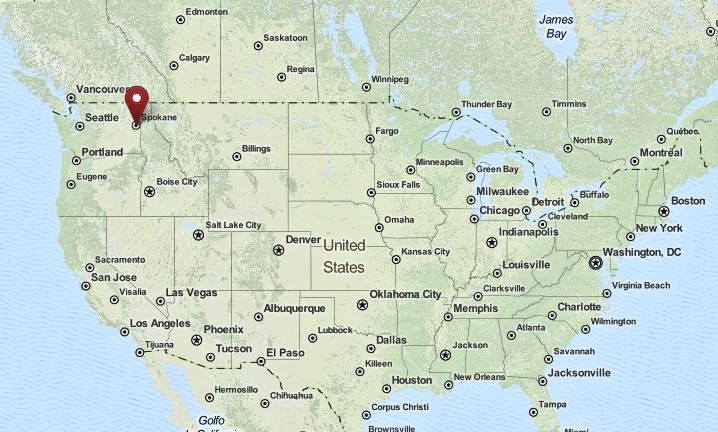
Abb.: Lage von Spokane
[Bildquelle: OpenStreetMap. --
Creative
Commons Lizenz (Namensnennung, share alike)]
1932-05
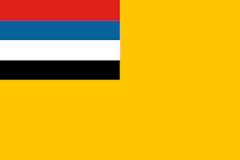
Siam lehnt den Wunsch des japanischen Marionettenstaats Manchukuo (滿洲國) ab, diplomatische Beziehungen aufzunehmen.
Abb.: Lage von Manchukuo (滿洲國)
[Bildquelle: Emok / Wikimedia. -- GNU FDLicense]
1932-05-03
Bangkok Times:
"Included in the middle class are intelligent people, but when they are driven to desperation it is difficult to foresee what they might do. What is known of them is that they cannot and will not remain idle; and we know what has been happening in India and China. The middle class is a strong and safe bulwark against anarchy and communism and should be helped to exist as a separate entity."
[Zitiert in: Batson, Benjamin Arthur <1942 - >: The end of the absolute monarchy in Siam. -- Singapore : Oxford Univ. Pr., 1984. -- 349 S. : Ill. ; 22 cm. -- (Southeast Asia publications series ; no. 10). -- ISBN 0-19-582612-4. -- S. 222]
1932-05-11
Aufhebung des Goldstandards der Währung. Der Baht wird wieder an Pound Sterling gebunden mit dem Alten Wechselkurs von 11 Baht pro Pound. Am folgenden Tag (12. Mai) ist die Royal Ploughing Ceremony (พระราชพิธีจรดพระนังคัลแรกนาขวัญ / แรกนาขวัญ).Durch diese Abwertung des Baht kommt die Handelsbilanz wieder ins Gleichgewicht. Der Reisexport steigt. Die Wirtschaftskrise scheint überwunden.
Das durchschnittliche Jahreseinkommen einer Bauernfamilie mit 25 Rai Land ist in den letzten 18 Monaten von 360 Baht auf 147 Baht gefallen.
1932-05-12

Buddhadasa Bhikkhu (พุทธทาสภิกขุ, 1906 - 1993) gründet Suan Mokkh I (สวนโมกข์)
Abb.: Lage von Suan Mokkh (สวนโมกข์)
[Bildquelle: OpenStreetMap. -- Creative Commons Lizenz (Namensnennung, share alike)]
"Suan Mokkh (thailändisch: สวนโมกข์, „Garten der Befreiung“), kurz für Suan Mokkhaphalaram (thailändisch: สวนโมกขพลาราม, von Pali Mokkhabalārāma, „Garten der Kraft der Befreiung“) ist ein Theravada-buddhistisches Kloster sowie Rückzugs- und Meditationszentrum in Amphoe Chaiya [ไชยา], Provinz Surat Thani [สุราษฎร์ธานี], im Süden Thailands. Es wurde 1932 von dem bekannten Mönch, Religions- und Sozialreformer Buddhadasa Bhikkhu [พุทธทาสภิกขุ, 1906 - 1993] begründet, der ein Vertreter und Vordenker des Engagierten Buddhismus war. Das Gelände hat eine Fläche von knapp 50 Hektar und ist größtenteils mit Wald bedeckt, womit es sich vom gerodeten, landwirtschaftlich genutzten Umland abhebt.
GeschichteBuddhadasa (eigentlich Ngueam Phanit [เงื่อม พานิช], 1906–1993), der damals noch den Ordensnamen Indapañño [อินทปัญโญ] trug, kehrte 1932 von seinen Studien in Bangkok in seine südthailändische Heimat zurück und bezog ein aufgegebenes Kloster (Wat) in der Nähe seines Geburtsorts Phumriang. Er nahm an, dass eine natürliche Umgebung der Praxis des Dhamma förderlich sei. Anders als in bestehenden Klöstern der thailändischen Waldtradition wollte er nicht der Lehre und den Meditationsfähigkeiten eines prominenten Mönchs nacheifern, sondern ausschließlich dem Dhamma und Vinaya des Gautama Buddha folgen. Studium und Praxis sah er nicht als Gegensätze, sondern als Ergänzung. Die jahrhundertealte Differenzierung des Sangha in studierende und Zeremonien verrichtende Stadtmönche und zurückgezogene, asketische, meditierende Waldmönche suchte er aufzuheben.
Während der ersten vier Jahre lebte Buddhadasa zumeist allein in Suan Mokkh, besuchte aber auch andere Wats, um dort zu lehren. Außerdem veröffentlichte er seine Ideen und Erkenntnisse in der vierteljährlichen Zeitschrift Buddha-Sasana [พุทธศาสนา] („Buddhismus“) und hielt Vorträge in der Buddha-Dhamma-Gesellschaft in Bangkok. Diese zeichneten sich durch eine schlichte Sprache, ohne das typischen Mönchsvokabular, und eine verstandesmäßige, entmythologisierte Interpretation der buddhistischen Lehren aus. Damit zog er auch die Aufmerksamkeit von etablierten Klerikern und Laien in der Hauptstadt auf sich. Ende der 1930er-Jahre schloss sich ihm eine kleine Gruppe von Mönchen an, andere – darunter auch hochrangige Vertreter der buddhistischen Hierarchie sowie Staatsbeamte – suchten ihn in Suan Mokkh auf.
Anfang der 1940er-Jahre war der ursprüngliche Suan Mokkh so überlaufen, dass er an einen anderen Ort verlegt werden musste. Im vormaligen Wat Than Nam Lai [วัดธารน้ำไหล] („Tempel des fließenden Wassers“), über dessen Gelände ein kleiner Fluss verläuft und auf dem sich die Überreste eines sehr alten Stupa fanden, wurde 1942 Suan Mokkh II begründet. Zwei Jahre später zog die Gemeinschaft endgültig dorthin um.
Suan Mokkh zog und zieht Anhänger und Interessenten der Philosophie Buddhadasas aus allen gesellschaftlichen Schichten, dem In- und Ausland an. Im Jahr 1972 besuchte Tenzin Gyatso [བསྟན་འཛིན་རྒྱ་མཚོ་, 1935 - ], der 14. Dalai Lama des tibetischen Vajrayana-Buddhismus, Suan Mokkh, um hier zu lehren.[5] 1989 wurde die Anlage deutlich erweitert, es entstand ein internationales Meditationszentrum. Auch ein eigenes Zentrum für Nonnen wurde eingerichtet. Buddhadasa starb 1993 in Suan Mokkh."
[Quelle: https://de.wikipedia.org/wiki/Suan_Mokkh. -- Zugriff am 2015-09-23]
"Siehe auch die hier herausgegebene Zeitschrift "Phutthasatsana" [พุทธศาสนา] (Buddhismus), die fast seit Gründung von "Suan Mok" erscheint. In dieser Zeitschrift erschien schon sehr früh eine Auseinandersetzung des Buddhismus mit weltlichen Fragen der Gegenwart, z.B.
- mit der buddhistischen Forderung nach Genügsamkeit,
- mit den Aufgaben der Nation,
- der Notwendigkeit von Militär,
- mit dem Problem des Schlachtens von Tieren
usw. in: "Phutthasatsana", November, B.E. 2479 [= 1936], S. 293-335 unter dem Titel "Sonthana Kap Nai Hetphon" [สนทนากับนายเหตุผล] (Gespräch mit Herrn 'Ursache'). "
[Quelle: Skrobanek, Walter <1941 - 2006>: Buddhistische Politik in Thailand : mit besonderer Berücksichtigung des heterodoxen Messianismus. -- Wiesbaden : Steiner, 1976. -- 315 S. ; 24 cm. -- (Beiträge zur Südasienforschung ; 23). -- ISBN 3-515-02390-9. -- Zugl.: Heidelberg, Univ., Diss., 1972. -- S. 141, Anm. 1. -- Mit Erlaubnis des inzwischen verstorbenen Autors]
1932-05-17
"Nai Chalong" [นายฉลอง] in einem Leserbrief an Bangkok Times:
"I would like to see Siam rise up one day to be one of the great Powers, if not the greatest, in the East."
1932-05-18

Der britische Gesandte Cecil Dormer (1883–1979) an Charles Orde, Chef des Far Eastern Department des britischen Außenministeriums:
"If we are to copy the French and bully the Siamese, we cannot expect the latter to continue as friendly as they have hitherto shown themselves in such matters as the control of Indian agitators and aviation. It is worth remembering that Siam cuts off the Federated Malay States from Burma and if she were to behave as a second Persia we should have a lot more trouble than we have now." [Zitiert in: Charivat Santaputra [จริย์วัฒน์ สันตะบุตร]: Thai foreign policy 1932-1946. -- Bangkok : Thai Khadi Research Institute, Thammasat University, 1985. -- 465 S. ; 21 cm. -- ISBN 974-335-091-8. -- S. 90]
1932-05-24
Communiqué des Finanzministeriums zur Kritik an der Einkommenssteuer:
"Later in the month the government responded to the barrage of criticism of the salary tax by issuing a special Ministry of Finance communiqué. The communiqué conceded that a general income tax was preferable, but maintained that it was difficult to administer, and continued with the somewhat disingenous argument that there were a host of other special taxes and that therefore when viewed as a whole the government tax structure was not unfair." [Quelle: Batson, Benjamin Arthur <1942 - >: The end of the absolute monarchy in Siam. -- Singapore : Oxford Univ. Pr., 1984. -- 349 S. : Ill. ; 22 cm. -- (Southeast Asia publications series ; no. 10). -- ISBN 0-19-582612-4. -- S. 222]
1932-05-26

Der britische Diplomat Johns an das Foreign Office:
In reporting the issuance of the communiqué, a British diplomat noted criticism in the press of the salary tax as affecting only one part of the population, and that Some have gone further and urged that there be no taxation without representation. This last can hardly be taken seriously as Siam is certainly not yet sufficiently advanced for a popular or democratic form of government.
When this despatch was received in London shortly after the 24 June coup, a hand in the Foreign Office commented,
‘No doubt the discontent caused by this act played a part in the recent revolution’."
[Zitiert in: Batson, Benjamin Arthur <1942 - >: The end of the absolute monarchy in Siam. -- Singapore : Oxford Univ. Pr., 1984. -- 349 S. : Ill. ; 22 cm. -- (Southeast Asia publications series ; no. 10). -- ISBN 0-19-582612-4. -- S. 222]
1932-05-28
Bangkok Times über Chiang Rai (เชียงราย / เจียง
ฮาย) :
Abb.: Lage von Chiang Rai (เชียงราย / เจียงฮาย) [Bildquelle: OpenStreetMap. -- Creative Commons Lizenz (Namensnennung, share alike)]
Chiang Rai [เชียงราย / เจียง ฮาย ] "shows its modern trend by now having a fine boulevard on the site of its old city wall."[Zitiert in: Batson, Benjamin Arthur <1942 - >: The end of the absolute monarchy in Siam. -- Singapore : Oxford Univ. Pr., 1984. -- 349 S. : Ill. ; 22 cm. -- (Southeast Asia publications series ; no. 10). -- ISBN 0-19-582612-4. -- S. 100]
1932-06
Phraya Songsuradet / Phraya Song (พระยาทรงสุรเดช, 1891/ 1892 - 1944) legt den Verschwörern einen Plan zum Sturz der absolutistischen Monarchie vor.
1932-06-01

Rama VII. an Mitglieder des Supreme Council:
"Can we teach the Thai people to support the "absolute monarchy"? I very much doubt it, for if we begin now it is already too late."
The king then discussed the possibility of introducing a fascist system in Siam, concluding,
"it might be desirable and the best way out. But could we do it? If not, perhaps we should prepare for a change to a ‘Constitutional Monarchy’ at the earliest possible moment, and direct education along that path."
[Übersetzung: Batson, Benjamin Arthur <1942 - >: The end of the absolute monarchy in Siam. -- Singapore : Oxford Univ. Pr., 1984. -- 349 S. : Ill. ; 22 cm. -- (Southeast Asia publications series ; no. 10). -- ISBN 0-19-582612-4. -- S. 153]
1932-06-04

Bangkok Times zitiert einen Artikel von "Pol d'Aramée", der auf Französisch in Saigon erschienen ist:
"Budget difficulties have always led to political changes, and Siam will not escape from the rule. An absolute monarchy which has been forced by events seriously to increase taxation could not long continue in the patriarchal form; it has itself signed a decree for its modernisation. Such is, the inevitable, if not imminent, consequence of the economic and financial crisis." [Zitiert in: Batson, Benjamin Arthur <1942 - >: The end of the absolute monarchy in Siam. -- Singapore : Oxford Univ. Pr., 1984. -- 349 S. : Ill. ; 22 cm. -- (Southeast Asia publications series ; no. 10). -- ISBN 0-19-582612-4. -- S. 223f.]
Bangkok Times berichtet auch, dass Siam den Goldstandard aufgegeben hat, weil die wichtigsten Weltmärkte für Reis (London) dem Silberstandard des britischen Pfund folgen.
1932-06-14 - 1941-12-08


Joseph Grew (180 - 1965) ist US-Botschafter in Japan. Er warnt die USA frühzeitig vor Japans imperialistischen Vorhaben in Asien.
1932-06-23
Der Polizeidirektor bittet am Abend den Innenminister, Prinz Paripatra Sukhumbhand ( สมเด็จพระเจ้าบรมวงศ์เธอ เจ้าฟ้าบริพัตรสุขุมพันธุ์ กรมพระนครสวรรค์วรพินิต, 1881 - 1944), um Erlaubnis, einige Personen festzunehmen, die im Verdacht einer Verschwörung gegen den Thron stehen. Da auf der Liste die Namen von Angehörigen angeshener Familien stehen, entscheidet der Innenminister, dass in dieser Angelegenheit am nächsten Tag weitere Ermittlungen erfolgen sollen.Da jede Aktion gegen einen Putsch der Zustimmung von Prinz Paripatra bedarf, steht sein Palst unter Überwachung durch die Verschwörer: sowohl durch ein Kanonenboot vom Fluss aus als auch durch eine Gruppe ziviler Verschwörer vom Land aus.
1932-06-24

Miltärputsch - การปฏิวัติสยาม พ.ศ. 2475 (bzw. การเปลี่ยนแปลงการปกครองสยาม พ.ศ. 2475) zur Abschaffung der absolutistischen Monarchie. Luang Phibulsonggram (พิบูลสงคราม, 1897 - 1964) ruft die Streitkräfte auf, sich an die erzwungenen Abgabe von Territorien zu erinnern indem sie bereit sind, jede ausländische Invasion zurückzuschlagen.
Da siamesische Staatsbedienstete und Militärs gewohnt sind, nur auf Anordnung von oben zu reagieren, stoßen die Putschisten auf keinen ernsthaften Widerstand, obwohl es kaum mehr als 100 Aufständische sind. Nur der Kommandant des First Army Corps, Major General Phraya Sena Songkhram (พระยาเสนาสงคราม) leistet ernsthaft Widerstand. Er ist die einzige Person, die während des Putsches verletzt wird.
Verkündigung der sechs Prinzipien (หลัก 6 ประการของคณะราษฎร) der Volkspartei - คณะราษฎร:
- Wahrung der Unabhängigkeit des Landes in jeder Hinsicht: politisch, rechtlich, ökonomisch usw.
- Wahrung der inneren Sicherheit, Verbrechensbekämpfung
- Verbesserung des Wohlstands des Volkes durch staatlich garantierte Vollbeschäftigung, Ausarbeitung eines nationalen Wirtschaftsplans, Vermeidung von Hunger
- Gleichheit vor dem Gesetz für alle
- Freiheitsrechte des Volkes, sofern keiner der vorgenannten vier Punkte verletzt wird
- Volle Bildung für alle
Der Kommandant der königlichen Garde sowie über 40 Mitglieder der Königsfamilie werden verhaftet und in der Thronhalle festgehalten, streng bewacht von der Kriegsmarine. Einzig Innenminister Prinz Paripatra Sukhumbhand ( สมเด็จพระเจ้าบรมวงศ์เธอ เจ้าฟ้าบริพัตรสุขุมพันธุ์ กรมพระนครสวรรค์วรพินิต, 1881 - 1944) entkommt der Verhaftung indem er auf einer Lokomotive nach Hua Hin (หัวหิน) zum König entfleucht.
Der König erfährt vom Putsch beim Golfspiel in Hua Hin, als er gerade das achte Loch erreicht hat.

Am Morgen des 24. wird die Botschaft der People's Party (คณะราษฎร) an das Volk als Flugblatt in ganz Bangkok verteilt. Der Text wird auch über Radio verbreitet:
"Dear People : When this king succeeded his brother, the public had primarily hoped that the new King would rule in such a way that they would live in peace. However, it was not as hoped. The King still held power above the law as before. He appointed his close relatives and flatterers, who had no virtue nor knowledge to important positions. The King did not listen to the voice of the people; he allowed civil servants to use their power corruptly to take bribes for government construction and purchase bids, to seek profit from money exchange, and to -waste the country’s financial resources.
The king gave the royalty more privileges than the people. He ruled without knowledge and left the country to fate as witnessed by the economic depression and hardships. This is generally known to the public. The "king above the law" government could not provide any remedy. Also, the government of this king did not rule for the public as other governments. The king’s government hold people as slaves (calling them phrai [ไพร่] or kha), animals, and did not consider them as human beings. Thus, instead of helping them, it continued to "plant rice on the back of the people. " It can be seen than taxes extracted from the people were channeled by the millions for the personal use of the king. For the people to earn anything, they had to toil until blood pours from their eyes. When it came to paying public or personal taxes, if the people did not have money, the government would confiscate property or subject them to forced labor. But the royalty eat and sleep happily. There is no country in this world which gives much money to princes except the cases of the Czar and the German Kaiser both of whom were overthrown by the people.
The king’s government had deceitfully and dishonestly ruled the people by saying that it would promote better living. But after waiting a long time, it was not seriously undertaken and has failed. Moreover, it insulted the people whom it owed taxes which fed the royalty. It said that the people could not have any voice in politics because they were stupid. If the people were stupid, the princes must also be so since they belong to the same nation. The people do not know as much as the princes not because they were stupid, but because they lacked education which the princes prevented them from acquiring. The royalty feared that should the people have education, they would see the royalty’s evils and would no longer allow the "planting of rice on their backs."
People ! Let it be known that our country belongs to the people and not to the king as was deceived. Our forefathers had rescued the freedom of the country from the hands of the enemy. The royalty only took advantage and gathered millions for themselves. Where did they get this money ? They took it from the people by "planting rice on their backs! " The country is in hardship, peasants and parents of soldiers have to abandon their lands because it could not be cultivated and the government takes no notice. The government has also dismissed a good number of workers, graduates and former soldiers have no jobs and are starving. These are the works of the king’s government which is above the law. It forced minor civil servants, corporals and clerks out of work with no pension. In fact, it should collect all the acquired money and create jobs. This should be appropriate towards the people who had paid taxes and made the royalty wealthy for such a long time. But the royalty have not done accordingly and still feed their bloodlust. Whatever amount of money they have left, they have salted them away in overseas banks to prepare to flee when the country is deteriorating and leave the people to starve. This is evil.
Therefore, people, civil servants, soldiers, and civilians who know about the above evils of the government have united and formed the People’s Party and taken power from the king’s government. The People’s Party deems that to undo the evils it would have to govern by a parliament to allow consultation of many rather than one. The Party does not wish to tear down the throne. Therefore, it invites the present king to remain but rule under a constitution where he could not do anything by himself except with the agreement of the House of Representatives. The People’s Party has informed the king of this and now awaits for a reply. If the king’s answer is negative or does not reply within the time allowed, for reasons of selfishness that his power has been stripped, he would be named a traitor. It would be necessary for the country to be governed in a democratic manner, that is, the head of the country would have to be a commoner whom the House of Representatives have appointed for a limited time. In this way, the public can hope that their needs would be best taken care of. Everyone will have jobs because our country is simply fertile. After we have confiscated the money which the royalty had collected in the millions by planting rice on the people’s backs, we can use the money for the country which would make it prosperous. The government which the People’s Party will set up will have a plan following academic principles unlike the blind king’s government-above-the-law. The main principles are as follows :
- to maintain and secure national independence, politically, juridically, and economically.
- to maintain internal security and to reduce crime.
- to take care of the people’s happiness and the economy by providing jobs for everyone ; to set up a national economic plan which will not allow starvation.
- to allow equal rights for the people (not letting the royalty have more rights than the people as before).
- to give the people liberty and freedom which should not jeopardize the above-mentioned principles.
- to provide full education for the public.
The people should unite to help the People’s Party to successfully carry out these tasks to the end. The People’s Party asks everyone, and those who did not join in taking power from the king’s "above the law" government to remain calm and work at their livelihood. Do not act in ways which would oppose the People’s Party. The public should help the country, themselves and their children. The country would have full independence. Everyone will have security, jobs, and will not starve. Everyone will have equal rights and freedom, not being subjected to corvée labor, to be servants and slaves to the royalty. It is an end to the "planting of rice on the people’s backs" for the royalty. Happiness and prosperity which is known as "si ariya" [ศรีอริย] would be enjoyed as wished by all.
The People’s Party (คณะราษฎร
)"[Übersetzung: Thai politics (1978), S. 4 -7]
Die Putschisten entschuldigten sich später beim König für dieses Manifest.
An den König schickten die Putschisten folgendes Ultimatum:
"The People’s Party consisting of civil and military officials have now taken over the administration of the country and have taken members of the Royal Family such as H.R.H. the Prince [Paripatra Sukhumbhand] of Nagor Svarga [สมเด็จพระเจ้าบรมวงศ์เธอ เจ้าฟ้าบริพัตรสุขุมพันธุ์ กรมพระนครสวรรค์วรพินิต] as hostages. If members of the People’s Party have received any injuries the Princes held in pawn will suffer in consequence. The People’s Party have no desire to make a seizure of the Royal possessions in any way. Their principal aim is to have a constitutional monarchy. We therefore enjoin Your Majesty to return to the Capital to reign again as king under the constitutional monarchy as established by the People’s Party. If Your Majesty refuses to accept the offer or refrains from replying within one hour after the receipt of this message the People’s Party will proclaim the Constitutional monarchial government by appointing another Prince whom they consider to be efficient to act as King. Signed,
Col. Phya Bahol Balabayuha
Col. Phya Song Suratej
Col. Phya Riddhi Aganey"[Übersetzung: Bangkok Times, 1932-07-24, zitiert in Landon (1939), S. 9f.]
Am Nachmittag des 24. erlässt Innenminister Prinz Paripatra Sukhumbhand ( สมเด็จพระเจ้าบรมวงศ์เธอ เจ้าฟ้าบริพัตรสุขุมพันธุ์ กรมพระนครสวรรค์วรพินิต, 1881 - 1944) einen Aufruf an das Volk, unnötiges Blutvergießen zu vermeiden.
In den Kinos wird statt der Königshymne ein nationalistisches Lied gespielt.
Das Außenministerium sendet auf Anordnung Pridis eine Note an alle diplomatischen Vertretungen in Siam, dass die neue Regierung Ausländer an Besitz und Leben schützen und alle internationalen Verträge einhalten werde.
Abb.: Zugehörigkeit zu Militärgattungen usw. führender Putschisten 1932, 1947, 1957
[Datengrundlage: Aufstellung in Thai politics (1978), S. 556 - 562]
Abb.: nach dem Putsch 1932Die Putschisten treffen schnell Vorkehrungen gegen einen Gegenputsch:
Colonel Phya Phahon Phonphayuhasena (พลเอก พระยา พหลพลพยุหเสนา, 1889-1958) wird Oberbefehlshaber, behält aber seinen Rang als Colonel
Clolonel Phraya Songsuradet / Phraya Song (พระยาทรงสุรเดช, 1891/ 1892 - 1944) wird stellvertretender Oberbefehlshaber, behält aber seinen Rang als Colonel
Die meisten Generale und hochrangigen Offiziere in Militär und Polizei werden entlassen bzw. pensioniert
An alle Garnisonen in den Provinzen ergeht der Befehl, alle Munition nach Bangkok zu schicken, da sie angeblich veraltet ist. Sie wird nicht ersetzt.
Die Kommandogealt der regionalen Garnisonen wird aufgehoben: alle Garnisonen sind nur noch an Befehle von Bangkok gebunden
Das Militär in Bangkok wird so reorganisiert, dass ein Putsch unwahrscheinlicher wird
All diese Vorgänge werden weitestgehend vor der Öffentlichkeit geheimgehalten.
Die Presse unterliegt strenger Zensur. Sie darf nicht einmal über die Sitzungen der gesetzgebenden Versammlung berichten.
1932-06-24
Abb.: Putschisten, Bangkok, 1932-05-24
1932-06-24
The Bangkok Times:
"The People’s Party, consisting of civil and military officials, have now taken over the administration of the country and have taken members of the Royal Family, such as H.R.H. the Prince of Nagor Svarga [Prince Boripat, สมเด็จพระเจ้าบรมวงศ์เธอ เจ้าฟ้าบริพัตรสุขุมพันธุ์ กรมพระนครสวรรค์วรพินิต, 1891 - 1944], as hostages. If members of the People’s Party receive any injuries, the Princes held in pawn will suffer in consequence. The People’s Party have no desire to make a seizure of Royal Possessions in any way. Their principal aim is to have a constitutional monarchy. We therefore enjoin Your Majesty to return to the Capital to reign again as King under the constitutional monarchy as established by the People’s Party. If Your Majesty refuses to accept the offer or refrains from replying within one hour after the receipt of this message, the People’s Party will proclaim a constitutional monarchical government by appointing another Prince whom they consider to be efficient to act as King." [Zitiert in: Thawatt Mokarapong [ธวัช มกรพงศ์]: History of the Thai revolution : a study in political behaviour. -- Bangkok : Chalermnit, 1972. -- S. 38.]
1932-06-24
Bangkok Daily Mail:
"Bangkok awoke this morning to find that the greatest political sensation of its 150 years of existence had taken place quietly and without forewarning in the early hours before dawn. By noon today it was generally known that the Army and the Navy had completed a successful coup for the purpose of bringing about a radical change in the Government of Siam
Except for scattering crowds in the neighbourhood- of the Throne Hall and the Grand Palace, there was not the slightest sign of excitement in the city this morning or this afternoon. Police were on duty as usual, Courts functioned, mail collections and deliveries were carried out as usual. It was reported that early this morning telephone wires at various Government Departments and at some official residences were cut, but if they were, somebody had made rapid repairs by ten o’clock. It was also reported that the land Telegraph system had been destroyed, but the Post and Telegraph Department was accepting both domestic and foreign telegrams and radiograms as usual this morning.
Scattering crowds gathered this morning at the roads leading to the Throne Hall, where the members of the Royal Family were under custody. The road was guarded by sailors with fixed bayonettes and none but Army or Navy cars bearing officers or men were admitted closer than two or three blocks to the imposing white palace in which a national drama was taking place.
Now and then a truckload of uniformed men, with a machine gun mounted, would appear from within the compound of the Throne Hall, and as they passed the crowds outside loud cheers arose, which the soldiers returned vociferously. There was no hysteria, no bad feeling anywhere evident. Foreigners who were curious to find out what was going on were politely told that they could not enter the Throne Hall, but that was all."
[Zitiert in: Thawatt Mokarapong [ธวัช มกรพงศ์]: History of the Thai revolution : a study in political behaviour. -- Bangkok : Chalermnit, 1972. -- S. 39f.]
1932-06-24

Das Foreign Office in London begrüßt den Umsturz: "So falls another autocracy."Charles Orde, Chef des Far Eastern Department des britischen Außenministeriums:
"One has long looked on Slam as a contented spot in the world of distress, out the peaceful Siamese has at last turned, apparently against the regime of princely privilege! Probably financial stringency has brought matters to a head indirectly." [Zitiert in: Charivat Santaputra [จริย์วัฒน์ สันตะบุตร]: Thai foreign policy 1932-1946. -- Bangkok : Thai Khadi Research Institute, Thammasat University, 1985. -- 465 S. ; 21 cm. -- ISBN 974-335-091-8. -- S. 113]
1932-06-25

Der König antwortet auf das Ultimatum:
"To the Military in Defence of Bangkok: I have received the letter in which you invite me to return to Bangkok as a constitutional monarch. For the sake of peace; and in order to save useless bloodshed; to avoid confusion and loss to the country; and, more, because I have already considered making this change myself, I am willing to co-operate in the establishment of a constitution under which I am willing to serve.
Furthermore, there is a possibility that, if I decline to continue in my office as king, the foreign powers will not recognize the new government. This might entail considerable difficulty for the government.
Physically I am not strong. I have no children to succeed me. My life-expectancy is not long, at least if I continue in this office. I have no desire for position or for personal aggrandisement. My ability to advance the progress of the race alone constrains me.
Accept this sincere expression of my feelings.
Prajadhipok"
[Übersetzung: Landon (1939), S. 10]
Nach dem Putsch unterzeichnet der König Routinedokumente, die ihm vorgelegt werden nur noch mit "ทราบ" ("zur Kenntnis genommen") und seinen Initialen.
1932-06-25

The New York Times: den folgenden Text schrieb der König unter einem Pseudonym:
"The question in this country is not whether we want a democracy or not, but whether a genuine democratic government is just now possible. Whether a person can cast a vote with full knowledge of the consequences of his act or not depends upon his standard of education and his age, and in view of the fact that the bulk of the people is still uneducated, it follows that if an Act of Constitution is passed in this country, such a law will have to disqualify by some method or other a large part of our population from voting... Siam has done nothing toward democracy, but it is the most she could have done under existing conditions." [Zitiert in: Thawatt Mokarapong [ธวัช มกรพงศ์] <1932 - >: History of the Thai revolution : a study in political behaviour. -- Bangkok : Chalermnit, 1972. -- S. 91.]
1932-06-25

J. F. John, britishcer Chargé d'Affaires, an das Foreign Office:
"Note verbal from the Foreign Office informs me "under instruction" that the provisional government now in control of the state will take every measure to preserve order, protection of life and property and that international obligations will be scrupulously observed." [Zitiert in: Charivat Santaputra [จริย์วัฒน์ สันตะบุตร]: Thai foreign policy 1932-1946. -- Bangkok : Thai Khadi Research Institute, Thammasat University, 1985. -- 465 S. ; 21 cm. -- ISBN 974-335-091-8. -- S. 105]
Das britische Foreign Office sieht keinen Grund, die neue Regierung nicht anzuerkennen:
"The King of Siam has not been dethroned, and this fact seems to be the only one which really concerns us. The new government, like the old one, is the government of the King of Slam, and there is no reason why official communications should not be addressed to it in the same way as the old one." [Zitiert in: Charivat Santaputra [จริย์วัฒน์ สันตะบุตร]: Thai foreign policy 1932-1946. -- Bangkok : Thai Khadi Research Institute, Thammasat University, 1985. -- 465 S. ; 21 cm. -- ISBN 974-335-091-8. -- S. 107]
1932-06-26

Der König kehrt nach Bangkok zurück. Er empfängt die führenden Putschisten mit den Worten: "I rise in honour of the Khana Ratsadorn (คณะราษฎร)."
Proklamation des Königs:
"His Majesty the King is pleased to proclaim that there is now in existence a People’s Party who have a strong desire to effect certain changes in order to remedy some defects existing in the government of Siam and the Siamese Nation in the same way as has been done in other countries. Hence the Party have acquired the power to control the State, with the aim to bring about a constitutional administration, and have requested us to accept the Kingship of Siam as heretofore under the new constitution of the country. In other countries such a change has never been brought about without strife and bloodshed, this being the first time in the history of the world that such a change has been effected without the use of force. Although some members of the Royal Family and some officials have been brought to the Throne Hall and detained, this is merely a measure of precaution for the safety of the Party concerned, and also that the change may be carried out smoothly. In no wise could such action be considered as assault or rough usage. What has been done is merely for the maintenance of order, and with due regard to the high rank of the persons concerned in every respect.
As a matter of fact we have long contemplated the institution of this constitutional monarchy and what the People’s Party have done is quite right and received our appreciation. In view of the good intention toward the country and the whole people, it cannot be considered that such action was based on evil intention in the least.
Therefore we issue this statement after applying our autograph thereto and we decree that any action of any individual of the People’s Party, if it should happen to be contrary to any existing law, is not to be considered to be in fact against the law.
Enacted this 26th of June, B.E. 2475 (M.R.)
Prajadhipok"
[Übersetzung: Bangkok Times, 1932-06-27, zitiert in Landon (1939), S. 15]
Die Putschisten entlassen die Gefangenen. Nur Prinz Paripatra Sukhumbhand ( สมเด็จพระเจ้าบรมวงศ์เธอ เจ้าฟ้าบริพัตรสุขุมพันธุ์ กรมพระนครสวรรค์วรพินิต, 1881 - 1944) muss das Land verlassen. Er wird an die südliche Landesgrenze gebracht, von wo er ins Exil auf Java in Niederländisch-Indien geht.
1932-06-27

Temporary Charter for the Administration of Siam Act 1932 (พระราชบัญญัติธรรมนูญการปกครองแผ่นดินสยามชั่วคราว พุทธศักราช 2475, 1. Verfassung)
Art: vorläufig
In Kraft: 1932-06-27 - 1932-12-10
Dauer: 5 Monate 12 Tage
aufgehoben: legal
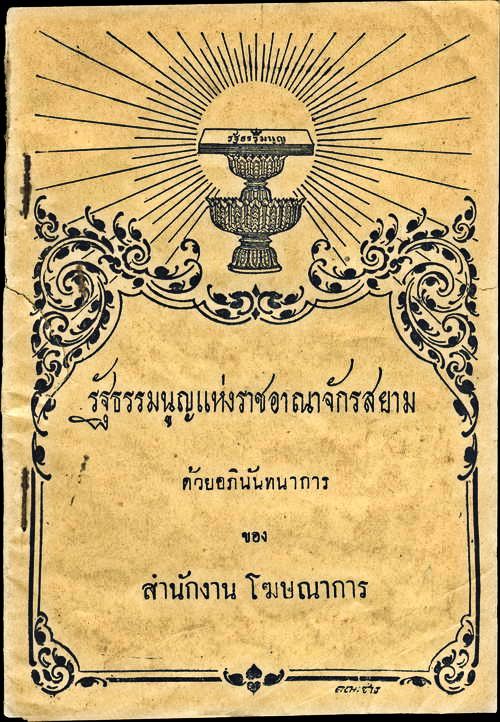
Abb.: Einbandtitel der Volksausgabe der Verfassung, 1932
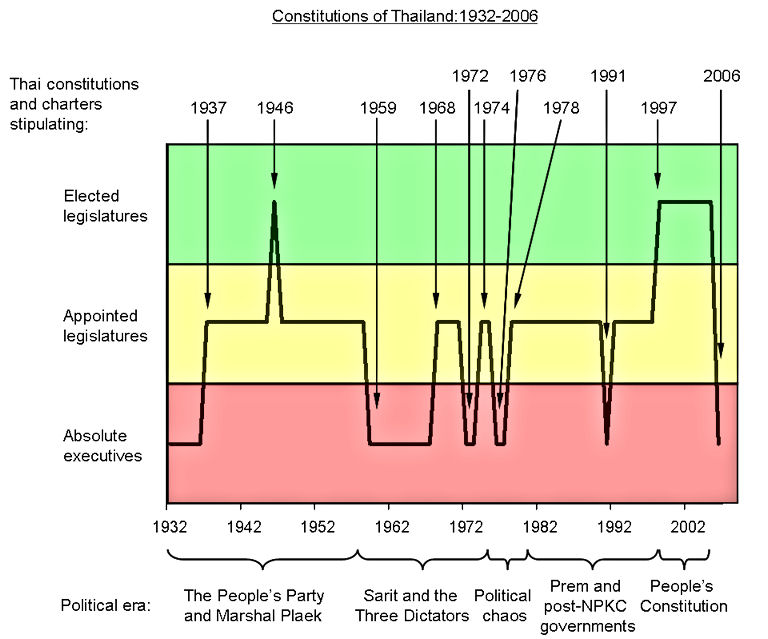
Abb.: Leidensgeschichte der Verfassungen Thailands 1932 - 2006
[Bildquelle: Patiwat Panurach / Wikimedia. --
Creative Commons
Lizenz (Namensnennung, share alike)]
Frauen haben Wahlrecht. Siam ist das erste asiatische Land mit Frauenwahlrecht.
Abb.: Ausstellung der ersten Verfassung auf dem Grund der Ananta Samakhom Thronhalle (พระที่นั่งอนันตสมาคม), 1932
Abb.: Lage der Ananta Samakhom Thronhalle (พระที่นั่งอนันตสมาคม)
[Bildquelle: OpenStreetMap. -- Creative Commons Lizenz (Namensnennung, share alike)]
1932-06-28 - 1933-06-21
Phya Manopakorn Nitithada (พระยามโนปกรณ์นิติธาดา, 1884-1948) ist Ministerpräsident (นายกรัฐมนตรีแห่งราชอาณาจักรไทย - Prime Minister)
Abb.: พระยามโนปกรณ์นิติธาดา - Phya Manopakorn Nitithada
[Bildquelle: Wikipedia. -- Public domain]
Abb.: Die Mitglieder der Putschregierung stellen sich dem Militär vor
"Phraya Manopakorn Nititada (auch Phya Manopakorn Nitithada - Thai: พระยามโนปกรณ์นิติธาดา, oder Gon Hutasingh (auch Hutasingha) - ก้อน หุตะสิงห์; * 15. Juli 1884 in Bangkok; † 1. Oktober 1948 in Penang, Malaysia) war auf der Vorschlag der Khana Ratsadon (Volkspartei) der erste Premierminister von Thailand, das zu dieser Zeit noch Siam hieß. Frühe Jahre und Ausbildung
Phraya Manopakorn Nititada wurde in Bangkok als Sohn von Nai Huad Hutasingh (Thai: นายฮวด กับนางแก้ว หุตะสิงห์) und dessen Frau Kaeo (Thai: นางแก้ว หุตะสิงห์) geboren. Er heiratete später Khunying Manopakorn Nititada (Thai: คุณหญิงมโนปกรณ์นิติธาดา, geborene Nit Samsen - นิตย์ สามเสน).
Seine Ausbildung begann er an der Schule des Wat Ratchaburana in Bangkok, später an dem Suan Kulab Wittayalai (Rosengarten-College), dem Assumption College und der Rechtspflegeschule des Justizministeriums. Nachdem er seinen Bachelor-Grad erreicht hatte, erhielt er ein königliches Stipendium für weitere Studien an der Rechtsschule der Anwaltskammer Middle Temple in England.
Rückkehr nach SiamNach seiner Rückkehr nach Thailand arbeitete Manopakorn zunächst im Justizministerium und erhielt den Titel Luang Praditpicharnkarn (Thai: หลวง ประดิษฐ์พิจารณ์การ). Aufgrund seiner Leistungen verlieh man ihm den Titel Phraya Manopakorn Nititada und machte ihn zum Justizminister. 1918 wurde er zum Geheimrat (Privy Councillor) des Königs Vajiravudh (Rama VI.) berufen.
PremierministerNach dem gewaltlosen Putsch im Juni 1932 mit dem Ziel, Siam in eine konstitutionelle Monarchie zu verwandeln, wurde Phraya Manopakorn Nititada auf Vorschlag von Pridi Phanomyong am 28. Juni 1932 um 14.00 Uhr aufgrund des Gesetzes zur Übergangsverwaltung des Königreichs Siam zum Präsidenten des Volkskomitees ernannt und fungierte so als eine Art Premierminister von Siam. Die Khana Ratsadon hatte zwar den Putsch zur Einführung einer Konstitutionellen Monarchie geplant und ausgeführt, doch wollte sie nicht den Eindruck erwecken, dies im eigenen Interesse geleistet zu haben. Deshalb wählte man den neutralen und angesehenen Phraya Manopakorn zum Präsidenten des Volkskomitees aus. Seine Aufgabe bestand in der Abfassung einer Verfassung für Siam. Am 10. Dezember des Jahres wurde die von König Prajadhipok abgesegnete neue Verfassung verkündet. Am selben Tag wurde Phraya Manopakorn, der zunächst als provisorischer Premier formal zurückgetreten war, zum ersten Premierminister unter dieser Verfassung ernannt. Heute erinnert der Verfassungstag von Thailand an den seinerzeit erfolgten Übergang von der Absoluten zur Konstitutionellen Monarchie in Siam.
Die Regierung von Phraya Manopakorn war gekennzeichnet von schwierigen wirtschaftlichen Verhältnissen. Zur Hälfte bestand das Kabinett aus Mitgliedern der Khana Ratsadon, der Rest waren Fachleute aus der Beamtenschaft und dem Militär. Die Regierung wurde auch durch Konflikte zwischen den Kabinettsmitgliedern belastet. Insbesondere nachdem Pridi dem König Prajadhipok einen Plan zur wirtschaftlichen Entwicklung Siams vorgelegt hatte, den dieser rundweg als "kommunistisch" ablehnte, nahmen die Spannungen zwischen den Befürwortern und Gegnern des Plans (und auch von Pridi) zu. Auch Phraya Manopakorn wandte sich gegen den Plan und versuchte Pridi kaltzustellen, indem er das Kabinett auflöste. Auch erklärte er einige Artikel der Verfassung für "vorübergehend ungültig" und setzte die Sitzungen des Volkskomitees und die Gerichtsarbeit aus. Diese Ereignisse werden auch als "kalter Putsch" oder "April-Putsch" (Thai: รัฐประหารในประเทศไทย เมษายน พ.ศ. 2476) bezeichnet. Pridi floh nach Frankreich.
Am 1. April 1933 wurde das Parlament per königlichem Dekret von König Prajadhipok aufgelöst und Phraya Manopakorn erneut zum Premierminister bestellt. Er erließ ein Gesetz gegen den Kommunismus, das es ihm ermöglichte, dem Kommunismus nahestehende Personen verhaften zu lassen. Dies betraf die gesamte Spitze der Kommunistischen Partei Siams. Die Pressefreiheit zu beschnitten, Pressezensur eingeführt und zahlreiche Zeitungen und Druckwerke verboten. Am 16. Juni 1933 traten General Phraya Phahon Phonphayuhasena, der starke Mann des militärischen Flügels der Khana Ratsadon, und drei weitere hohe Militärs aus "gesundheitlichen Gründen" von ihren Kabinettsämtern zurück.
Sturz und ExilPhraya Manopakorn blieb bis 20. Juni 1933 im Amt, als Phahon abermals einen unblutigen Staatsstreich durchführte. Phraya Manopakorn wurde nach Penang ins Exil geschickt. Er lebte dort bis zu seinem Tod am 1. Oktober 1948."
[Quelle: http://de.wikipedia.org/wiki/Phraya_Manopakorn_Nititada. -- Zugriff am 2011-10-06]
1932-06-28 - 1932-12-10
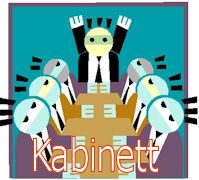
1. Kabinett: Manopakorn (มโนปกรณ์) I
1932-06-28

Auf Wunsch der People's Party: Brief des Königs an den Minister of the Palace, Chao Phya Worapongse Pipat:
"I have received a letter from the People’s Party which states that some members of our Royal Family have indulged in criticism of the new regime, and this, if overlooked, may become so widespread as to cause unrest and chaos in the country. If this is true, such action is deplorable. In my opinion, the royal princes should instead help maintain peace and order, since the establishment of the constitutional regime has in fact previously been one of my plans. You are therefore commanded to make it clear to the royal princes and those who are loyal to' me that they should refrain from such criticism or any attitude which may jeopardize the maintenance of peace and order in the country."
[Übersetzt in: Thawatt Mokarapong [ธวัช มกรพงศ์] <1932 - >: History of the Thai revolution : a study in political behaviour. -- Bangkok : Chalermnit, 1972. -- S. 104f.]
1932-06-29 - 1933-06-24
Phraya Sri Visarn Vacha (Srivisarn Huntrakul) (พระยาศรีวิสารวาจา (หุ่น ฮุนตระกูล), 1896 - 1968) ist Außenminister. Er ist ein strenger Royalist und Gegner der Putschisten, der noch 1931 dem König abgeraten hat, eine Verfassung einzuführen. Er behauptet, zur Übernahme des Ministeramts gezwungen worden zu sein. Er behält seinen britischen Pass, um im Notfall jederzeit fliehen zu können.
Abb.: Phraya Sri Visarn Vacha (Srivisarn Huntrakul) (พระยาศรีวิสารวาจา (หุ่น ฮุนตระกูล))
[Bildquelle: th.Wikipedia. -- Public domain]
1932-06-29
Phya Songsuradej (พระยาทรงสุรเดช, 1891/92 - 1944) über den 26. Juni 1932:
"The fact that the people did not understand democracy and were indifferent to it was clearly shown during the inauguration of the constitutional regime at the Throne Hall on June 29, 1932. We had to round them up to attend the ceremony. Only a handful of them came and listened to the government declaration, but without the least comprehension. Had we arranged a stage play and served them with Chinese noodle soup, perhaps more people would have come." [พระยาทรงสุรเดช <1891/92 - 1944>: บันทึกพระยาทรงสุรเดช. -- Bangkok, 1947. -- S. 260f. -- Übersetzt in: Thawatt Mokarapong [ธวัช มกรพงศ์] <1932 - >: History of the Thai revolution : a study in political behaviour. -- Bangkok : Chalermnit, 1972. -- S. 85.]
1932-06-29

Der britische Geschäftsträger Johns an das Foreign Office über ein Gespräch mit Prinz Devawongse Varodaya (พระวรวงศ์เธอ พระองค์เจ้าไตรทศประพันธ์ กรมหมื่นเทววงศ์วโรทัย, 1883 - 1943):
"He then referred to the constitution and told me that some six months ago the King had instructed him to draw up a constitution to I be presented to the people on the occasion of the 150th anniversary of the Chakri dynasty, that is to say, on the 5th April last. However, the Princes had opposed this project and the King had to give way, although His Majesty had warned them at the time that the inevitable result would be a coup d’etat and a military dictatorship. This had now happened and the Princes were reaping the results of their own actions. Prince Devawongs mentioned no names, but he was obviously referring to the members of the Supreme Council as these would have been the only Princes whom His Majesty would have consulted in such a matter." [Zitiert in: Batson, Benjamin Arthur <1942 - >: The end of the absolute monarchy in Siam. -- Singapore : Oxford Univ. Pr., 1984. -- 349 S. : Ill. ; 22 cm. -- (Southeast Asia publications series ; no. 10). -- ISBN 0-19-582612-4. -- S. 151]
1932-06-30


Rama VII. an Mrs. Helen Rogers Reid (1882 –1970) und Mr. Ogden Mills Reid (1882 - 1947), auf deren Sitz in New York der König 1931 wohnte. Ogden Mills Reid ist Herausgeber der New York Herald Tribune. Das Ehepaar hatte in einem Telegramm an den König Besoprgnis übers ein befinden nach dem Putsch geäußert.
"People’s Party and I have been working towards the same aim namely Constitution for our Country, but without knowing each others plans. My plans have met with much opposition of ultra-conservatives and even foreign advisers deemed radical change unwise. The people became naturally impatient and took matters into their own hands. They have acted with admirable restraint not a single life being lost. Legal Government composed of well-known and able Statesmen now constituted and merits all confidence. Both Queen and I are well." [Zitiert in: Batson, Benjamin Arthur <1942 - >: The end of the absolute monarchy in Siam. -- Singapore : Oxford Univ. Pr., 1984. -- 349 S. : Ill. ; 22 cm. -- (Southeast Asia publications series ; no. 10). -- ISBN 0-19-582612-4. -- S. 237]
1932-06-30
Bangkok Times berichtet aus Phitsanulok (พิษณุโลก)
Abb.: Lage von Phitsanulok (พิษณุโลก)
[Bildquelle: OpenStreetMap. -- Creative Commons Lizenz (Namensnennung, share alike)]
"There is a large sale of newspapers and the three or four radios of the town eager listeners, but no demonstration of any nature has been made so far as has been observed. Confidence in and loyalty to His Majesty are heard freely on all sides." [Zitiert in: Batson, Benjamin Arthur <1942 - >: The end of the absolute monarchy in Siam. -- Singapore : Oxford Univ. Pr., 1984. -- 349 S. : Ill. ; 22 cm. -- (Southeast Asia publications series ; no. 10). -- ISBN 0-19-582612-4. -- S. 266, Anm. 20]]
1932-06/07

Folgende Zeitungen berichten über Stalins Planwirtschaft (Fünfjahrespläne / пятиле́тки):
- สัจจัง (Wahrheit)
- ยี่สิบสี่มิถุนา ("24. Juni")
- มวลชนรายสัปดาห์ ("Wochenzeitung Die Massen")
План — закон, выполнение — долг, перевыполнение — честь
Der Plan ist Gesetz. - Seine Erfüllung ist Pflicht. - Seine Übererfüllung ist uns Ehre!
1932-07ff.
Aktionen der Revolutionsregierung
Aufhebung der Steuererhöhungen der letzten Jahre. Damit wird der falschen Eindruck erweckt, dass die Revolution Steuerbefreiung bedeute.
Reduzierung der Steuer auf Reisland um 50%
Die Einkommenssteuer wird auf Geschäftseinkommen ausgedehnt
Aufhebung des Supreme Council of Stae
Aufhebung des Committee of Priy Council
- Reduktion der Monthon (มณฑล) von 10 auf 4
- Fusion des Handels- und Verkehrsministeriums mit dem Landwirtschaftsministerium
- Auflösung der Ministerien of Privy Seal und Royal Household
- Bildung eines Kabinetts
- Bildung einer Assembly mit 70 Mitgliedern
- Bildung des Machtzentrums People's Party Committe mit 15 Mitgliedern
- Fast alle Spitzenmilitärs aus der Zeit der absoluten Monarchie werden in den Ruhestand versetzt
1932-07
Aufhebung der Pressezensur
"The coup d’etat of June 1932 certainly provided Siamese journalism, despite immediate censorship, with the most sensational copy in its history. It waxed enthusiastic about the new democracy, but was soon disillusioned as far as its own freedom was concerned. Early in July Phya Bahol [พระยาพหลพลพยุหเสนา, 1887 - 1947]a nnounced the end of the censorship, adding that the People’s Party was very grateful for the attitude of the press towards their movement. He expressed the hope that nothing would be written against the king or the princes that might destroy the new entente and requested all editors to consult the People’s Party before publishing any confidential news that they might receive. A week later the Thai Num accused Prince Paribatra [Paribatra Sukhumbandh, Prinz von Nakhon Sawan (สมเด็จพระเจ้าบรมวงศ์ เธอ เจ้าฟ้าบริพัตรสุขุมพันธุ์ กรมพระนครสวรรค์วรพินิต, 1881 - 1944] of having accepted a bribe of £50,000 in connection with the contract for the Memorial Bridge [สะพานปฐมบรมราชานุสรณ์
]; and soon afterwards another vernacular paper published an article with the gay headline "Prince Greedy of Sexual Intercourse," in which the writer remarked that in the old days his paper would have been suppressed for such comments. This freedom was so liberally used to agitate for the removal of unpopular officials, and by officials themselves to air their views, that the Government issued an order that all such communications thereafter be sent directly to the interested Department and no longer to the press.The Government soon showed that it had no intention of letting the press give the lead in its new policies. Although censorship was formally abolished in July 1932, four Siamese papers were temporarily closed down in September for publishing criticisms of the Government. It was simultaneously decided not to admit the press for the time being to the meetings of the Senate or to permit publication of news regarding the army or navy. This move drew ironical shafts from the Daily Mail about such unwarranted ignoring of civil liberties by a supposedly democratic Government. The reply to this was a new press law, also in September 1932, formally censoring all political and military news. A few days later a fifth Siamese daily was suspended. The protests of the English language papers and of an occasional Siamese proprietor like Luang Vichitr [Luang Wichitwathakan - หลวงวิจิตรวาทการ, วิจิตร วิจิตรวาทการ - 金良, 1898 - 1962] were in vain. At the ceremony of the promulgation of the constitution in December, only six reporters, chosen by lot, were allowed to be present. The rest had to depend upon such information as was contributed by their rivals."
[Quelle: Thompson, Virginia <1903 - 1990>: Thailand the new Siam. -- New York : Macmillan, 1941. -- S. 795f.]
1932
Bald nach der Revolution erscheinen zwei linksradikale Zeitungen:
- 24 มิถุนายน [24. Juni] / hrsg. von Sanguan Tularaksa (สงวน ตุลารักษ์, 1902 - 1995)
- สัจจัง [Wahrheit] / hrsg. von Thongkham Rohittasiri
"Sanguan Tularaksa (June 18, 1902 - May 15, 1995; Thai สงวน ตุลารักษ์) was a Thai politician and a leading member of the Seri Thai (เสรีไทย). Sanguan is of Chinese descent, and is of Teochew (潮州人) origins.[1] A longtime Pridi (Pridi Banomyong -: ปรีดี พนมยงค์, 1900 - 1983) acolyte and member of the 1932 coup group, Sanguan was a member of the National Assembly and Chairman of the Bureau of Tobacco Monopoly in the Ministry of Finance.
In 1943 he was made the leader of a delegation sent by the Free Thai Leader to establish contacts with the Allies at Chungking (重慶). His efforts proved crucial to the securing of British and American support for the underground movement, which would soon receive arms and equipment for effective guerrilla operations.
In 1946 he was appointed ambassador to the Republic of China (中華民國). He refused to return to Thailand following the coup d'état of 1947, declaring that the new constitution was illegitimate. Sanguan spent the next decade living in China. He returned to Thailand in 1957 and was jailed by the government of Field Marshal Sarit Thanarat (สฤษดิ์ ธนะรัชต์, 1908 - 1963). He was released in 1965."
[Quelle: http://en.wikipedia.org/wiki/Sanguan_Tularaksa. -- Zugriff am 2015-01-26]
1932

Tengku Mahmud Mahyiddin, der Sohn des letzten Sultans von Patani (Kerajaan Patani) (كراجأن ڤتتاني), kommt nach Bangkok, um zu erklären, dass die Malaien Südsiams zur Koperation mit der demokratischen Regierung bereit sind.
1932-07
Das Fischereiministerium lässt für 10.000 Baht in Lang Suan (หลังสวน) und Chumpon (ชุมพร) Experimente mit der Produktion von Fischkonserven in Dosen durchführen.
Abb.: Lage von Lang Suan (หลังสวน) und Chumpon (ชุมพร)
[Bildquelle: OpenStreetMap. -- Creative Commons Lizenz (Namensnennung, share alike)]
Abb.: ®Reklame für Fischkonserven, 2013
[Fair use]
1932-07-02

Als einer der ersten hochrangigen Prinzen erklärt Prinz Aditya Dibabha Abhakara (พลโท พลเรือโท พลอากาศโท พระเจ้าวรวงศ์เธอ พระองค์เจ้าอาทิตย์ทิพอาภา, 1900 - 1946), Gouverneur von Nakhon Pathom (นครปฐม), seine Unterstützung für den Khana Ratsadorn (คณะราษฎร). Er sagt in einer Rede in Nakhon Pathom:
"Yes, I am a Prince, but don't forget that I am a Thai." [Zitiert in: Batson, Benjamin Arthur <1942 - >: The end of the absolute monarchy in Siam. -- Singapore : Oxford Univ. Pr., 1984. -- 349 S. : Ill. ; 22 cm. -- (Southeast Asia publications series ; no. 10). -- ISBN 0-19-582612-4. -- S. 253]
1932-07-05

Ein Beamter des britischen Foreign Office notiert auf einen Aktendeckel mit einem Berift der Bangkoker Gesandtschaft:
"It needed a revolution in Siam in order to bring in an income tax which would touch the bigger incomes. This is a most important advance and should do much to restore confidence in Siam’s financial stability, or at least her determination and ability to recover it." [Zitiert in: Batson, Benjamin Arthur <1942 - >: The end of the absolute monarchy in Siam. -- Singapore : Oxford Univ. Pr., 1984. -- 349 S. : Ill. ; 22 cm. -- (Southeast Asia publications series ; no. 10). -- ISBN 0-19-582612-4. -- S. 238]
1932-07-08
Die Bangkok Times charakterisiert den Umsturz:
"There is no evidence that the masses took any part in the recent Demonstration. The discontent of the salaried classes, and especially of the officers of the Army and Navy clearly counted for most in the movement. At the same time a contributory cause is to be found in the extension of education in Siam. Since the middle of the nineteenth century, when King Mongkut produced Western methods and technique, increasing numbers of Siamese students have been trained in Europe. An educated class of officials, administrators, and officers, having once been formed, it was only a question of time and opportunity before they demanded a share in the government of the country. Recently it has been necessary to make extensive salary cuts and to introduce taxation which for the first time touches the personal incomes of large numbers of the people. Also every young Siamese looks to government service for a livelihood and the service is no longer able to absorb the large numbers who pass through the schools. Siam has created an educated class without having been equally successful in providing suitable openings for employment of the new abilities. This is probably the reason for revolt for it is a natural turn from hope of government employ to politics."
[Zitiert in Landon (1939), S. 23]
1932-07-12
Die von der früheren Regierung subventionierte Zeitung หนังสือพิมพ์ไทย (Nangsuepim Thai), ein Sprachrohr der früheren Regierung, stellt nachdem sie 23 Jahre erschienen ist, ihr Erscheinen ein. Begründung: sie sei nicht länger nötig.
Abb.: Ausgabe 1931-10-27
[Bildquelel: th.Wikipedia. -- Public domain]
1932-07-13
Bangkok Daily Mail: Die riesigen Importzölle haben teilweise kuriose Folgen:
die einheimischen Zigarettenfabriken werden geschlossen, da die Zölle auf ausländischen Tabak so hoch sind, dass importierte ausländische Zigaretten billiger sind als siamesische (mit ihrer Mischung aus einheimischen und ausländischem Tabak)
eine Fabrik überlegt die Verlagerung von bangkok nach Hong Kong, da die Fertigprodukte aus Hong Kong billiger sind als die in Bangkok produzierten Produkte
importierte Seifen und Parfüme sind billiger als wenn sie mit importierten Bestandteilen in Bangkok hergestellt werden
1932-07-21
Senator Mangkorn Samsen (มังกร สามเสน, 1888 - 1948) legt einen Wirtschaftplan vor. Unter anderem schlägt er eine weitere Abwertung des Baht vor.
1932-07-26
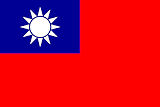
Die Kuomintang-Regierung Chinas gratuliert der People's Party (คณะราษฎร) zum Umsturz. Dies obwohl keine Chinesen am Umsturz beteiligt waren und auch in der Regierung keine Chinesen vertreten sind. Dies gibt Anlass zu Gerüchten, dass dies eine geheime Botschaft der Unterstützung durch die Kommunistische Internationale (Komintern / Коминтерн / 共产国际) sei.
1932-08 - 1932-12
Da in den Provinzen die Bevölkerung gegenüber dem Umsturz weitgehend apathisch ist, schickt die Regierung Teams in die Provinzen, die den Umsturz erklären und um Unterstützung für die neue Regierung und die Verfassung werben sollen.
1932-08
Der Staat Siam hat keine Inlandsschulden und Auslandanleihen nur im Wert von £11 Mio. Die Regierung erklärt, dass die Haushaltsdefizite der letzten beiden Jahre durch den Debt Redemption Fund gedeckt sind. Silbermünzen werden zum zweitwichtigsten Exportgut.
1932-08
Einführung einer Bank- und Versicherungssteuer. Betroffen sind vor allem Ausländer.
1932-08
Die Komintern (Kommunistische Internationale) gratuliert der People's Party (คณะราษฎร) zum Umsturz.
Abb.: Zeitschriftentitel
1932-08/09
In Bangkok erscheinen radikale Flugblätter der "Communist Party of Siam" und andere der "Party Opposed to the Royal Family". Die Texte sind in Chinesisch, Thai und Englisch abgefasst und offenkundig von Gebildeten abgefasst. Die Verteilung ist aber stümperhaft, sodass die Polizei die Flugblätter bündelweise konfiszieren kann.
1932-08 - 1932-10
Streiks von
Riksha-Kulis gegen die Rikscha-Besitzer, die von den Kulis 40 Satang täglich an Pacht für die Rikschas nehmen
Straßenbahnangestellten
Färberinnen, deren Tageslohn von 40 auf 30 Satang gekürzt worden war: der Streik ist erfolgreich
zwei Eliteschulen
1932-08-03


Der britische Gesandte Cecil Dormer (1883–1979) an das Foreign Office über die Reaktion Chinas auf den Putsch:
"The Chinese, as far as I have been able to ascertain, have held studiously aloof, but the KMT [Kuomintang - 中國國民黨], according to the press, have addressed a telegram to the executive committee, through the Ministry of Foreign Affairs, congratulating the People's Party on their achievement. And since then the Overseas Affair Committee is reported to have pressed on Nanking [南京] the desirability of sending a special emissary to Siam for the purpose of negotiating a treaty. The proposal is not likely to be more welcome in Bangkok now than it was before." [Zitiert in: Charivat Santaputra [จริย์วัฒน์ สันตะบุตร]: Thai foreign policy 1932-1946. -- Bangkok : Thai Khadi Research Institute, Thammasat University, 1985. -- 465 S. ; 21 cm. -- ISBN 974-335-091-8. -- S. 110f.]
1932-08-05
Bangkok Times berichtet, dass man in Nan (น่าน) vom Putsch über Radio erfahren hat und dass dort die Vorgänge in Bangkok "passed over our heads".
Abb.: Lage von Nan (น่าน)
[Bildquelle: OpenStreetMap. -- Creative Commons Lizenz (Namensnennung, share alike)]
1932-08-08 - 1938-01-04
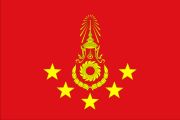
General Phraya Phahon Phonphayuhasena (Phot Phahonyothin) (พลเอก พระยาพหลพลพยุหเสนา (พจน์ พหลโยธิน), 1887 - 1947) ist Commander-in-Chief of the Royal Thai Army (ผู้บัญชาการทหารบก)
Abb.: Phraya Phahon Phonphayuhasena (Phot Phahonyothin) (พลเอก พระยาพหลพลพยุหเสนา (พจน์ พหลโยธิน))
[Bildquelle: th.Wikipedia. -- Public domain]
1932-08-12

Bericht der deutschen Gesandtschaft an das Auswärtige Amt
"Die große Anhänglichkeit Siams an Deutschland im militärischen Bereich wurde offenbar, als am 12. August 1932 sich der stellvertretende Leiter der siamesischen Firma „Suphan Phanit Co., Ltd., Bangkok" an die deutsche Gesandtschaft in Bangkok wandte. Nach Angaben von Herrn Lautenschlager, der die Geschäfte der deutschen Gesandtschaft in Bangkok nach Ende der Amtszeit von Dr. Asmis übernahm, habe der stellvertretende Leiter der genannten Firma, die als Vertreter verschiedener großer ausländischer Werke in Bangkok fungierte und ausgezeichnete Beziehungen zu der neuen siamesischen Regierung unterhielt, von ihm Kataloge über Kriegsmaterial deutscher Hersteller angefordert. Wie der stellvertretende Leiter weiterhin geäußert habe, habe seine Firma die Information bekommen, dass es deutsche Werke außerhalb Deutschlands gäbe. Aus diesem Grund bestehe bei seiner Firma der Wunsch, zunächst Angebote für Panzerwagen, Panzer, Maschinengewehre, Kanonen, Pistolen, Gewehre sowie Flugzeuge zu bekommen, um sie dann der siamesischen Regierung wiederum anzubieten. Mit dem Hinweis darauf, dass die Gesandtschaft infolge der Bindungen des Versailler Vertrags, sowie auf Grund der deutschen Gesetzgebung und aus allgemeinen Erwägungen einer amtlichen Vermittlung von Kriegsmaterial-Lieferungen ablehnend gegenüberstehe, berichtete Herr Lautenschlager dem Auswärtigen Amt, dass er aufgrund von späteren wirtschaftlichen Vorteilen Deutschlands jedoch zugesagt habe, dem stellvertretenden Leiter bei der Beschaffung des Kataloges behilflich zu sein. Denn diesem stellvertretenden Leiter zufolge könnten später andere Lieferungsmöglichkeiten, wie für Kabel oder für die optische und feinmechanische Industrie folgen. Außerdem bemerkte Herr Lautenschlager aufmerksam, dass die unter der Anforderung der Firma Suphan Phanit stehenden „Mauserpistolen mit kurzem Lauf" [M1921 "Bolo" Mauser mit 99 mm Lauf] nicht unter das Kriegsgeräte-Gesetz fielen und deswegen aus Deutschland geliefert werden könnten. So bat er das Auswärtige Amt, es solle seiner Entscheidung zustimmen und die Zentralstelle für Außenhandel veranlassen, den Katalog unmittelbar an die Firma Suphan Phanit zu übersenden."
[Quelle: Catthiyakorn Sasitharamas [คัททิยากร ศศิธรามาส]: Die deutsch-thailändischen Beziehungen in der Zeit der Weimarer Republik bis zum Ende des Zweiten Weltkriegs. -- Hamburg : Kovač, 2012. -- 346 S. ; 21 cm. -- (Schriftenreihe Schriften zur Geschichtsforschung des 20. Jahrhunderts ; Bd. 4). -- ISBN 978-3-8300-6361-2. -- Zugl.: Hamburg, Univ., Diss., 2012. -- S. 258f. -- Fair use]
1932-08-13
Die Bangkok Times charakterisiert den Umsturz:
"The success of the revolution is explained by its character. There was no explosion from below but there was merely a readjustment. Capable men simply stepped into the shoes of the Princes and the thing was done. They called themselves the People’s Party but the general public were spectators only. The King acceded quietly and the President of the new Senate complimented his party on having the King on their side. They recognize that the sovereign retains the love of the masses. There have been no persecutions of less appreciated members of the Royal family. Outwardly the new regime is democratic, but in practice so far it is a one party government of mildly Fascist complexion." [Zitiert in Landon (1939), S. 23]
1932-08-27
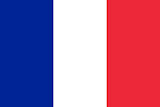
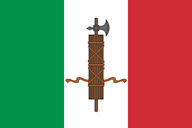
Bangkok Times zitiert eine französische Zeitschrift:
"We have yet to learn who will be the Mussolini [Benito Amilcare Andrea Mussolini, 1883 - 1945] of the new Siamese Fascist State. If there is no lasting head, we fear that the People’s Party [คณะราษฎร] may prove to be singularly like the Chinese Kuomintang [中國國民黨] and become the occasion of frequent internal difficulties. In the interests of the very sympathetic Siamese people themselves, may this fear prove groundless!" [Zitiert in: Batson, Benjamin Arthur <1942 - >: The end of the absolute monarchy in Siam. -- Singapore : Oxford Univ. Pr., 1984. -- 349 S. : Ill. ; 22 cm. -- (Southeast Asia publications series ; no. 10). -- ISBN 0-19-582612-4. -- S. 267, Anm. 24]
1932-08-29
Die Bangkok Times charakterisiert den Umsturz:
"The democratic idea had attained considerable growth. In some cases it was an innocent seed carried with simple education on Western lines; in other cases it was a growth assiduously cultivated for years by a small group of civil service and army men educated mostly in France and Germany. The People’s Party which they founded has spread through all departments of government. When the signal was given these turned over allegiance from King to Party without question." [Zitiert in Landon (1939), S. 24]
1932-09

Mönche bilden Parteien, um den Äbten der buddhistischen Hierarchie ihre Macht zu entziehen. Die Regierung unterstützt die Hierarchie.
1932-09

Chitty Sucharitkul (จิตติ สุจริตกุล, 1911 - 1970) lobt in สามัคคีสาร = Samaggi Sara, der Zeitschrift von The Thai Association in the UK die Putschisten und den König. Der Artikel wird 1932-11-04 in Bangkok Times nachgedruckt:
"On the very noticeable fact that up to the present no ministerial post has been granted to any member of the Royal Family. Now it cannot be denied that there are noble and able princes as well as those whose records are not quite all that can be desired. Are we to condemn generality by particulars and deprive all princes of the most responsible positions? It is indeed to be hoped otherwise for to do so might create an element which is highly undesirable—that is class consciousness and a spirit of distrust. Princes can be patriots as well as peasants."
"The editorial, by Chitty Sucharitakul, praised both the coup leaders
‘men of destiny ... of very high character’
and the king for his role in the establishment of constitutional government in Siam
‘that it did not come sooner was really no fault of his’,
and concluded,
‘Happy will be the day when we see all classes striving in harmony for the betterment of our Fatherland’."
[Zitiert in: Batson, Benjamin Arthur <1942 - >: The end of the absolute monarchy in Siam. -- Singapore : Oxford Univ. Pr., 1984. -- 349 S. : Ill. ; 22 cm. -- (Southeast Asia publications series ; no. 10). -- ISBN 0-19-582612-4. -- S. 244; 270, Anm. 56]
1932-09-01

Rama VII. kommentiert den Finanzbericht des ehemaligen britischen Finanzberaters Edmund Leo Hall-Patch (1896 - 1975):
"The Hall-Patch report for 1931/2 was never published, although after the coup Hall-Patch wrote from Europe to the new Minister of Finance expressing his hope that ‘with the changes that have taken place since my departure, it may be possible for you to take the necessary measures which were impossible under the old régime’,
and suggesting specifically that his report be published,
‘as the reasons which mitigated against its publication should now no longer apply’.
The new government sent a copy of Hall-Patch’s letter to the king, and Prajadhipok made one of his few lengthy comments on a post-coup document :
This letter is very ‘interesting’, and I hope that he is correct that the world economy may improve and perhaps has already begun to improve, because if the world economic situation doesn’t improve no matter who governs Siam the situation will be extremely dangerous, since if the people become poorer and the wealthy are squeezed more the discontent which fills the country will surely explode.
The king was unenthusiastic about the suggestion to publish the report, pointing out some of its faults and suggesting that the government consult the records of discussions under the old regime and talk to Prince Devawongs [พระวรวงศ์เธอ พระองค์เจ้าไตรทศประพันธ์ กรมหมื่นเทววงศวโรทัย, 1883 - 1943] and Stevens [Raymond Bartlett Stevens, 1874 - 1942] before agreeing, and he strongly objected to a suggestion by Hall-Patch that the former Financial Adviser should be kept informed by the government concerning details of Siam’s finances."
[Quelle: Batson, Benjamin Arthur <1942 - >: The end of the absolute monarchy in Siam. -- Singapore : Oxford Univ. Pr., 1984. -- 349 S. : Ill. ; 22 cm. -- (Southeast Asia publications series ; no. 10). -- ISBN 0-19-582612-4. -- S. 213]
1932-09-02
Laut Bangkok Times, die sich auf die Zeitung ศรีกรุง (Sri Krung) beruft, hat die People's Party 10.000 Mitglieder, davon sind
- 23 Phraya (พระยา)
- 65 Phra (พระ)
- 376 Luang (หลวง)
- 328 Khun (ขุน)
1932-09-05
Karikatur über die Begierden eines Alten, im Periodikum Ying thai (หญิงไทย):
Abb.: Begierden eines Alten (แก่ตัณหา)
[Bildquelle: Barmé (2002), S. 221]
1932-09-09
Streik an einer Bangkoker Oberschule gegen bestimmte disziplinarische Maßnahmen. Die Öffentlichkeit ist über solche Aufmüpfigkeit schockiert.
1932-09-20
Die Communist Party of Siam (CPS, 共產黨暹羅 / Đảng Cộng sản Siam / พรรคคอมมิวนิสต์แห่งสยาม) hat 325 Mitglieder, darunter kein einziger Thai. 55 der Mitglieder sind Vietnamesen, 270 Chinesen (10 oder 20 Kantonesen - 廣府人, der Rest Hainanesen - 海南人). In Nordosttthailand hat die CPS rund 1000 vietnamesische Sympathisanten.
1932-09-24
Bangkok Times: "Much expected"
"The good name which modem Siam acquired for herself in the outside world by her policy of quiet and steady progress for the last 40 years, does not seem to have been in the least affected by the recent change in the administration that has been accepted abroad with sympathy and confidence." [Zitiert in: Charivat Santaputra [จริย์วัฒน์ สันตะบุตร]: Thai foreign policy 1932-1946. -- Bangkok : Thai Khadi Research Institute, Thammasat University, 1985. -- 465 S. ; 21 cm. -- ISBN 974-335-091-8. -- S. ]
1932-09-26

Bangkok Times druckt einen Brief des ehemaligen britischen Finanzberaters Edmund Leo Hall-Patch (1896 - 1975) an The Times <London> ab:
"In September the Bangkok Times reprinted a Hall-Patch letter to the Times of London saying that it was not true that there had been no financial report, but that it had not been published, and attributing his resignation to the fact that the budget ‘was only balanced on paper’."
[Quelle: Batson, Benjamin Arthur <1942 - >: The end of the absolute monarchy in Siam. -- Singapore : Oxford Univ. Pr., 1984. -- 349 S. : Ill. ; 22 cm. -- (Southeast Asia publications series ; no. 10). -- ISBN 0-19-582612-4. -- S. 213f.]
1932-09-29

In Bangkok und Phichit (พิจิตร), Udon (อุดรธานี), Nong Khai (หนองคาย), Sakon Nakhon (สกลนคร) und Nakhon Phanom (นครพนม) tauchen Flugblätter auf, die zum Volksaufstand und zur Bildung eines Sowjet-Siam (сове́т Сиам / โซเวียตสยาม) aufrufen. In all den genannten Orten gibt es vietnamesische Gemeinschaften.
Abb.: Lage der Städte, in denen kommunistische Flugblätter auftauchen
[Bildquelle: CIA. -- Public domain]
"They were duplicated texts in Thai, English and Chinese which began by proclaiming: "Peasants, workers and all oppressed people of Siam, the tyrannical government of Prajadhipok was overthrown in a night and replaced by a constitutional government. But this new government, is it a government of the people, for the people, by the people?"
There followed criticism of several promoters, who were accused of pursuing their own personal interests. The leaflets ended:
"Rise, people of Siam! The Khana Ratsadorn [คณะราษฎร], the false revolutionaries, can never do us any good. The Russians are the only people in the world today who have any real freedom and happiness, for they have got rid of the Czar [ц︢рь], the princes and the false revolutionaries and have taken their country into their own hands. People of Siam, let us follow in the footsteps of our brothers in Russia. Unite in the struggle against the King, the princes and the Khana Ratsadorn, the false revolutionaries, and imperialism. Establish a Soviet [сове́т] government of Siam so that we can have real independence and liberty!""
[Zitiert in: Stowe, Judith A. <1934 - 2007>: Siam becomes Thailand : a story of intrigue. -- Honolulu : Univ. of Hawaii Pr., 1991. -- 394 S. : Ill. ; 22 cm. -- ISBN 0-8248-1394-4. -- S. 47]
1932-09-29

Industrie und Handel : tägliche Korrespondenz für Aussenhandel und Auslandswirtschaft <Berlin>:
"Aus der Zeitschrift „Industrie und Handel" Nr. 226 vom 29. September 1932 [...] ging hervor, dass die Luftliniengesellschaft plane, drei internationale Strecken aufzubauen. Für diese Aufgabe habe die Gesellschaft den ehemaligen amerikanischen Generalpostmeister-Assistant Praeger [Otto, 1871 - 1948] „verpflichtet". Der Zeitschrift zufolge sei Praeger als Leiter der umfassenden Luftpostvorarbeiten in den Vereinigten Staaten bekannt geworden, mit denen er 1918 begonnen und die er 1921 zu einem gewissen Abschluss gebracht habe. Neben Praeger habe die Gesellschaft mit dem amerikanischen Flughafenfachmann, Jackson ebenfalls einen Arbeitsvertrag abgeschlossen. Die erwähnten neu zu gründenden Strecken, die Anschluss an schon bestehende Luftverkehrsstrecken bekommen sollten, würden Bangkok mit Rangoon [ရန်ကုန်], Hanoi [Hà Nộ] und zuletzt Hongkong [香港] verbinden. Die Verbindung nach Rangoon würde Anschluss an die Holland-Indienstrecke der Niederländer bekommen, während die Verbindung nach Hanoi sich an den französischen Dienst Marseille- Hanoi anschließen würde. Die dritte Verbindung nach Hongkong bekäme Anschluss an den chinesischen Luftdienst, der zuerst durch Amerikaner ausgeführt worden sei und nach längerer Unterbrechung von den Chinesen selbst, doch mit amerikanischer Unterstützung betrieben werde. Ebenfalls an gemerkt wurde von der Zeitschrift des weiteren die Tatsache, dass bei der Gesellschaft mit Ausnahme der beiden amerikanischen Leiter „nur mit siamesischem Personal" gearbeitet werden dürfe und dass die Siamesen bekanntlich recht gute Flieger seien." [Quelle: Catthiyakorn Sasitharamas [คัททิยากร ศศิธรามาส]: Die deutsch-thailändischen Beziehungen in der Zeit der Weimarer Republik bis zum Ende des Zweiten Weltkriegs. -- Hamburg : Kovač, 2012. -- 346 S. ; 21 cm. -- (Schriftenreihe Schriften zur Geschichtsforschung des 20. Jahrhunderts ; Bd. 4). -- ISBN 978-3-8300-6361-2. -- Zugl.: Hamburg, Univ., Diss., 2012. -- S. 139f., Anm. 234. -- Fair use]
1932-10
Über 1000 Anwärter bestehen die Zugangsprüfungen zum öffentlichen Dienst. Das ist weit mehr als Stellen zur Verfügung stehen. Die Regierung versucht, Mathayom-Absolventen (มัธยม, Sekundarschule) auch in andere Berufssparten zu lenken. Während der absoluten Monarchie wurden alle Mathayom-Absolventen im öffentlichen Dienst angestellt.
1932-10

Die Regierung registriert in einer feierlichen buddhistischen Zeremonie die 1897 gegründete Gewerkschaft der Straßenbahnbediensteten. Sie hat ca. 300 Mitglieder.
1932-10
Bangkok: 指導报 [Zhidao Bao], die Monatszeitschrift der Communist Party of Siam (CPS, 共產黨暹羅 / Đảng Cộng sản Siam / พรรคคอมมิวนิสต์แห่งสยาม) über die ethnische Zusammensetzung der CPS:
"Our Party is called the Communist Party of Siam, but in truth our Party has only Chinese... .The basis by which we can change Siam comes down to a method by which we can bring Siamese into the Party. This is not a new problem. The same measure was discussed at our meeting last year...where we decided that the first step was for members to study Siamese in preparation for contacting Siamese. It was decided to seek results in six months, but from that time to the present it has been a year and not a single branch has announced progress." [Übersetzt in: Kasian Tejapira [เกษียร เตชะพีระ] <1957 - >: Commodifying Marxism : the formation of modern Thai radical culture, 1927-1958. -- Kyoto : Kyoto Univ. Pr., 2001. -- 390 S. : Ill. ; 23 cm. -- (Kyoto area studies on Asia ; 3). -- ISBN 1876843985. -- Revision of the author's thesis (doctoral) -- Cornell University, 1992. -- S. 26]
1932-10-01

Ergänzende Bekanntmachung des Mahathera-Samakhom [มหาเถรสมาคม] über Fragen des buddhistischen Ordens:
"Ergänzende Bekanntmachung der Mahathera-Samakhom [มหาเถรสมาคม] über Fragen des buddhistischen Ordens Zur Zeit ist Unruhe im buddhistischen Orden entstanden. Mönche, deren Einblick nicht sehr tief geht und die sich nicht an den Dhamma und die Vinaya-Regeln des Buddhismus halten, haben sich zusammengeschlossen, um ihre Äbte zu zwingen, ihnen die Macht zu übertragen. Sie wollen frei und gleich in der Ordensverwaltung sein. Das aber widerspricht den Grundsätzen der Ordenspolitik. Solche Mönche haben keine Achtung vor der klösterlichen Ordnung, und sie widersetzen sich dem Gesetz zur Verwaltung des buddhistischen Ordens von 1902 [Buddhist Church Administration Act of the Ratanakosin Year 121 - พระราชบัญญัติ. ลักษณะปกครองคณะสงฆ์ ร.ศ.๑๒๑, 1902], demzufolge Äbte und Chao Khana [เจ้าคณะ] durch die Klösterliche Gemeinschaft sowie durch königliche Dekrete ernannt werden.
Die Ordensverwaltung ist den Anordnungen des Buddha unterworfen. Seit Lebzeiten des Buddha trägt der Orden selbst dafür die Verantwortung. Ursprünglich verwaltete der Buddha die klösterliche Gemeinschaft selbst, weil seine Anhänger noch nicht überall verstreut waren. Als es aber mehr Mönche gab und sie nicht mehr vereint lebten, da musste die Verwaltung ausgebaut werden. Mit dem Dhamma und den Vinaya-Regeln, die der Buddha verkündete und verbreitete, erhielten seine Schüler umfassende Informationen über diese Frage. In der Absicht, den Buddhismus auf ein festes Fundament zu stellen, erlaubte der Buddha, dass die klösterliche Gemeinschaft mit Hilfe des Dhamma und der Vinaya-Regeln für ihre Verwaltung selbst verantwortlich ist. - Genauso wie es uns folgendes Buddha-Wort vor Augen führt:
"Und siehe Ananda, wenn wir der Welt entrückt sind, dann sollen Dhamma und Vinaya, die wir euch verkündet haben, euer aller Lehrmeister sein".
Dennoch braucht der buddhistische Orden Theras [เถร], als Führer in stufenweiser Rangfolge. Heute füllen diese Funktion die Äbte und Chao Khana bis hinauf zum Patriarchen [สังฆราช] aus. Sie lösen die Fragen des Ordens und achten darauf, dass Lehre und Praxis dem Dhamma und den Vinaya-Regeln entsprechen. Daneben bestehen die Versammlungen der Mahathera-Samakhom, die Verfehlungen untersucht und Maßnahmen in klösterlichen und allgemein religiösen Fragen trifft. Damit verfolgt man das Ziel, dass der Orden dem Dhamma folgt und das Wohlergehen der Gemeinschaft aller Buddhisten erreicht wird. Jede Gruppe, ob groß oder klein, braucht ihre Führer. Wenn in einer Gruppe nur nach Gutdünken eines Einzelnen oder eines Teils der Gruppe gehandelt wird und man nicht geeint zusammensteht, dann kann es keine gedeihliche Entwicklung geben. Wer jemanden dabei beobachtet, der sich in einer dem Dhamma widersprechenden Weise verhält, der hat - gemäß den Anordnungen des Buddha- die Möglichkeit, am Ende der buddhistischen Regenzeit eine Verwarnung auszusprechen. Außerdem hat er das Recht, einen Bericht an seine Vorgesetzten bis hinauf zum Patriarchen zu richten. Diese Regelung hat das Ziel, dass die klösterliche Gemeinschaft einig und rein bleibt. Falsch ist es, nach eigenem Gutdünken vorzugehen. Ungerecht ist es, wenn man sich nicht an die Vinaya-Regeln hält und sich abspaltet, um - wie das jetzt in den Klöstern geschieht - die Freiheit von Einzelnen oder von Gruppen zu erzielen. Alle Klöster unterstehen der Verwaltung der klösterlichen Gemeinschaft. Wer diese siebst in die Hand nehmen will, der gefährdet die geordnete klösterliche Gemeinschaft. So gibt es ja auch ein Buddha-Wort über den "A-parihāniya-dhamma" mit folgendem Wortlaut:"Seht ihr Bhikkhu's, solange ihr jene vor langer Zeit ordinierten Theras, die Verantwortung tragen und Führer, Patriarchen und Verwalter des Ordens sind, achtet und verehrt und deren Worte hochschätzt, solange könnt ihr auf eine gedeihliche Entwicklung hoffen und braucht keinen Niedergang zu befürchten".
Dieses Buddha-Wort zeigt, dass die Verwaltung des buddhistischen Ordens - obwohl die rituellen Zeremonien von den Mönchen ausgeführt werden - als Säulen auch verantwortlicher und reifer Theras bedarf, die Verachtung und Verehrung genießen. Obwohl unser erhabener Lehrmeister die Mönche für die Ausführung der rituellen Zeremonien (Sangha-kamma) verantwortlich gemacht hat, so bekleiden doch Einzelne den Posten des Führers oder Patriarchen des Ordens,.... Um aus den Heiligen Schriften zu zitieren:
"Die Mönchsgemeinschaft hat den Buddha als ihren Führer".
Analog zu diesem Grundsatz erfolgten auch die königlichen Dekrete über die Verwaltung des Ordens. Die revoltierenden Mönche, die jetzt eigenmächtig die Macht der Äbte und der Vorgesetzten Chao Khana brechen wollen, haben nicht die vorgeschriebenen Wege beschritten, nämlich sie haben weder eine Verwarnung erteilt, noch ihrem Vorgesetzten einen Bericht zugeleitet. Dies ist ein Verstoß gegen den Grundsatz der Verehrung und Achtung der Führer des Ordens, und zwar auch dann, wenn sich ein Abt oder Chao Khana falsch verhalten haben sollte. Mehr noch: Dies kann zu einer Spaltung des Ordens führen, zu einem Schisma, einem der fünf Kapitaldelikte, die schwer bestraft werden müssen. Ein solches Verhalten müsste nach den Vorschriften des "Kamma-khandhaka" bestraft werden, durch Tajjanīyakamma, Beschneidung gewisser Rechte eines Mönches, oder durch "Pabbājanīyakamma", Ausschluss aus dem Orden. Aber diesmal haben die Mönche im Hochgefühl gehandelt, ohne alle Konsequenzen zu durchschauen. Die Äbte und Chao Khana mögen daher die Mönche darüber aufklären, dass sich in der Ordensverwaltung in keiner Weise etwas geändert hat und dass nach wie vor das königliche Dekret über die Ordensverwaltung (von 1902) sowie die Anordnungen der Führer des Ordens gelten. Es dürfen keine weiteren Übergriffe mehr Vorkommen. Andernfalls müssen nach folgendem Verfahren Strafen verhängt werden:
- Wenn Mönche den Frieden des buddhistischen Ordens stören, sowohl was die Verwaltung als auch was die Lehre betrifft, sei es einzeln oder in Gruppen, so bedeutet dies eine Zerstörung der Religion, was mit schwerer Strafe belegt werden muss. Wenn ein solcher Fall in einem Kloster oder in irgendeinem religiösen Verwaltungsbezirk vorkommt, so werden der zuständige Abt oder Chao Khana aufgefordert, Sanktionen zu verhängen, die nach dem "Tajjanīya-kamma" angemessen sind, d. h. es sind, dem Schuldmaß entsprechend, gewisse mönchische Rechte einzuschränken....
- Wenn aber ein Mönch bestraft wurde oder des Klosters verwiesen wurde, jedoch der Anordnung weder Folge leistet noch ein Berufungsverfahren einleitet, dann möge der zuständige Abt oder Chao Khana den Ausschluss des Beschuldigten aus dem buddhistischen Orden erzwingen, und zwar weil gegen die Anordnung Widerstand geleistet wurde.
- Wenn der Beschuldigte sich dem Ausschluss aus dem buddhistischen Orden widersetzt, so möge der zuständige Abt oder Chao Khana um Amtshilfe bei den Beamten der politischen Verwaltung jener Region ersuchen und auf diese Weise den Ausschluss herbeiführen.
- Wenn das Berufungsverfahren eines Beschuldigten, der den Orden verlassen soll, geprüft ist und keine anderslautende Entscheidung gefällt wird, der Beschuldigte jedoch immer noch Widerstand leistet, dann möge der Chao Khana der kleinsten kirchlichen Verwaltungseinheit (Khwaeng [แขวง]) oder der nächsthöhere zuständige Chao Khana den Ausschluss analog zu Punkt 3 einleiten.
Verkündet am 1. Oktober B. E. 2475 (= 1932)
Kromluang Chinworasiriwat [สมเด็จพระสังฆราชเจ้า กรมหลวง ชินวรสิริวัฒน์]"[Übersetzung: Skrobanek, Walter <1941 - 2006>: Buddhistische Politik in Thailand : mit besonderer Berücksichtigung des heterodoxen Messianismus. -- Wiesbaden : Steiner, 1976. -- 315 S. ; 24 cm. -- (Beiträge zur Südasienforschung ; 23). -- ISBN 3-515-02390-9. -- Zugl.: Heidelberg, Univ., Diss., 1972. -- S. 258 - 260. -- Mit Erlaubnis des inzwischen verstorbenen Autors]
1932-10-04

Laut Bericht der deutschen Gesandtschaft an das Auswärtige Amt werden zunehmend Deutsche im Regierungsdienst oder im privaten Geschäftsbereich entlassen. Grund sei einerseits die weltweite Wirtschaftsdepression als auch das Bestreben Siams, die Zahl der Ausländer im Staatsdienst zu reduzieren.
1932-10-26


R. V. Bowker, britisches foreign Office, über die Beziehung Chinas zu Siam:
"The influence of Nanking [南京] on the new administration looks like being considerable and the Chinese question is likely to be one of the most vital In the future development of Slam. There are 440,000 Chinese in a total population of 8,000,000 and they are far more vigorous, both physically and mentally, than the Siamese." [Zitiert in: Charivat Santaputra [จริย์วัฒน์ สันตะบุตร]: Thai foreign policy 1932-1946. -- Bangkok : Thai Khadi Research Institute, Thammasat University, 1985. -- 465 S. ; 21 cm. -- ISBN 974-335-091-8. -- S. 111]
1932-10-28

Bangkok Times: Mönche des Bangkoker Klosters Wat Intharawihan (วัดอินทรวิหาร) beschuldigen ihren Abt, Gelder des Klosters unkontrolliert ausgegeben zu haben.
Abb.: Lage von Wat Intharawihan (วัดอินทรวิหาร)
[Bildquelle: OpenStreetMap. -- Creative Commons Lizenz (Namensnennung, share alike)]
1932-11
Konfiskation kommunistischer Literatur. Einfuhrverbot für kommunistische chinesische Zeitungen.
1932-11
Streik der Beschäftigten der Siam Electric Company wegen der Entlassung einiger Straßenbahnarbeiter und einiger Vertragsänderungen.
1932-11-08

Der 39. Gebutstag Ramas VII. (1893 - 1941) wird mit vollem Pomp gefeiert. Ursprünglich hatte die Regierung geplant, aus Sparsamkeit den Geburtstag mit einem Minimum an Aufwand zu feiern. Davon kam man ab, um die Unterstützung des Volks für die Putschregierung zu gewinnen. Als Gegenleistung tritt der König in der Öffentlichkeit auf.
1932-11-16
Der Entwurf der Verfassung wird dem Parlament vorgelegt. Der Kommissionsvorsitzende erklärt, dass die Dbbate schnell vorangehen muss, da die königlichen Astrologen den 10. Dezember als günstigsten Tag für die Promulgation bestimmt haben. Das Parlament gibt sich darum nur 10 Tage für Die Beratung.
1932-11-17

Siam kauft zehn 10 britische Leichtpanzer Panzer Vickers Mark E Type B (Vickers 6-ton). Sie werden 1933 geliefert.
Abb.: Vickers Mark E Type B (Vickers 6-ton) bei Manöver, frühe 1930er-Jahre
1932-12
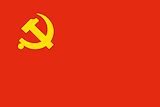
Die Polizei konfisziert kommunistische Flugblätter, die aus China eingeschleust worden waren.
1932
Prinz Wan Waithayakon (พระเจ้าวรวงศ์เธอ พระองค์เจ้า วรรณไวทยากร กรมหมื่นนราธิปพงศ์ประพันธ์, 1891 - 1976) über über Thai-Neubildungen statt westlicher Lehnwörter:
"It is the Thai language that will guarantee the security of the Thai nation. This is because if we favor the use of Thai transliterations of Western words about ideas, we may walk too fast. That is we may imitate other people’s ideas directly instead of pre-modifying them to accord with our ideas. But if we use Thai words and hence must coin new ones, we will have to walk deliberately." [Übersetzt in: Kasian Tejapira [เกษียร เตชะพีระ] <1957 - >: Commodifying Marxism : the formation of modern Thai radical culture, 1927-1958. -- Kyoto : Kyoto Univ. Pr., 2001. -- 390 S. : Ill. ; 23 cm. -- (Kyoto area studies on Asia ; 3). -- ISBN 1876843985. -- Revision of the author's thesis (doctoral) -- Cornell University, 1992. -- S. 197]
Prinz Wan bildet u.a. folgende Neologismen (Wortneubildungen):
- Ökonomie
- สังคม - Gesellschaft
- เศรษฐกิจ
นโยบาย - Politikระบบ - Systemระบอบ - Regime พัฒนา - Entwicklungปฏิวัติ - Revolutionปฏิรูป - Reformวิวัฒ - Evolution),กรรมาชีพ - Proletariatกระฎุมพี - Bourgeoisie มวลชน - Massen, สังคมนิยม - Sozialismusองค์กร - Organisationสหภาพ - Gewerkschaftวัฒนธรรม - cultureวิพาก - Kritik จุดยืน Standpunktปรัชญา -Philosophieอรรถนิยม - Realismus จินตนิยม - Romantik [Vorlage: Kasian Tejapira [เกษียร เตชะพีระ] <1957 - >: Commodifying Marxism : the formation of modern Thai radical culture, 1927-1958. -- Kyoto : Kyoto Univ. Pr., 2001. -- 390 S. : Ill. ; 23 cm. -- (Kyoto area studies on Asia ; 3). -- ISBN 1876843985. -- Revision of the author's thesis (doctoral) -- Cornell University, 1992. -- S. 197]
1932-12-07

Führer der Peoples Party bitten in einer Zeremonie im Königspalast um Vergebung für ihre früheren Angriffe auf die Monarchie.
Antwort des Königs:
"I thank you very much for holding a ceremony of asking forgiveness from me and the other members of the Royal House of Chakri. Your action today has given me great pleasure. It is not because you apologize to me alone for I have long since forgiven you. I understand that you have national interests at heart, and I am therefore willing' to try my best to promote your cause, which I also share. What really gave me great pleasure is the recognition, in your speech of apology, that the Chakri kings and the members of the royal family have made a great contribution to present-day progress in Siam, and this is quite true . . . Since you have made a corrected statement today and admitted that the Chakri dynasty has done a great deal to bring about much progress and benefit to the nation, this should erase all feelings of sorrow and bitterness that other members of the royal family, as well as I myself, have felt before . . . Your apology today also proves that whatever you have done, you have sincerely believed that it was for the benefit of our nation . . . The confession of your error, I believe, will help you to gain much public confidence . . . Finally, I wish you every kind of blessing. May you enjoy prosperity and long happy lives as well as healthy minds and bodies to enable you to work for the good of our country forever." [Zitiert und übersetzt in: Thawatt Mokarapong [ธวัช มกรพงศ์] <1932 - >: History of the Thai revolution : a study in political behaviour. -- Bangkok : Chalermnit, 1972. -- S. 110.]
1932-12-10 - 1933-04-01

2. Kabinett: Manopakorn (มโนปกรณ์) II
1932-12-10 15:00

Von den königlichen Astrologen festgelegter günstigster Zeitpunkt (1932-12-10 zwischen 14:53 und 15:05) für die Promulgation: The Constitution of the Siam Kingdom 1932 (รัฐธรรมนูญแห่งราชอาณาจักรสยาม, 2. Verfassung). Die Promulgation erfolgt mit dem Schlagen von Gongs und dem Blasen eines Schneckenhorns.
Das Volk zeigt wenig Interesse an dem Ereignis. Man musste Leute vor der Thronhalle zum Applaus zusammentreiben. Phraya Songsuradet / Phraya Song (พระยาทรงสุรเดช, 1891/ 1892 - 1944) bemerkt später, dass man mehr Beifall erhalten hätte, wenn man öffentliche Unterhaltung und Nudelsuppe (ก๋วยเตี๋ยว) angeboten hätte.
Art: endgültig
In Kraft: 1932-12-10 - 1946-05-09
Dauer: 13 Jahre 4 Monate 29 Tage
verändert: 1939, 1940, 1940
aufgehoben: legal

Beginn der Präambel:
"May you prosper. The Buddhist Era is 2475. It is the year of the monkey, the month of the deer’s head, the 13th of the waxing moon in the lunar calendar. The solar time is the 10th of December. The lunar and the solar times are identical according to the calculation. King Prachathipok: the great power of the world, a king in the Chakkri Dynasty; the great in the Sun’s Dynasty who is God’s beloved; a pure descendent of the Kings who are warriors; the great man of the royal family; the king of world; the great emperor with pure high birth; King Chulalongkorn’s son; King Wachirawut’s brother; strict in monarchial morality code; with uncomparable power of merit; with a former incarnation’s power, success and exquisite characteristics; a superb example of men; well-known everywhere; full of merits from the former life; an incarnation of God with widespread fame; uncomparably mighty and powerful under the auspices of all the benevolent gods; bringing good auspices; happiness-creating righteous king; educated in the nine arts of warriors; clever in war strategy; with quick and errorless decision; with honest conduct and superb knowledge; with beautiful quickness of mind; with full knowledge of administration; with ministers and chief ministers; with a powerful navy and a large number of soldiers; with great brothers, prestige and success; sitting on the great throne, under a nine-tiered state umbrella with superb majestic form wearing the great crown; the powerful conqueror in all ten directions; the great king; the great protector; the observer of the Buddhist precepts and the respector of the three gems; the great king with great honor; with kind calm heart, uncomparable might of righteousness, large territory and good subjects; the great religious king, His Majesty King Pokklao."
[Übersetzung: Thai politics (1979), S. 96]
Abb.: Rama VII. übergibt in der Thronhalle dem Parlamentspräsidenten die neue Verfassung, 1932-12-10 14:53
[Bildquelle: adaptorplug. -- http://www.flickr.com/photos/11401580@N03/3791115938/. -- Zugriff am 2011-10-24. -- Creative Commons Lizenz (Namensnennung, keine kommerzielle Nutzung)]
Abb.: Buddhistische Zeremonien bei der Promulgation der Verfassung, 1932-12-10
1932-12
Die Chinese Chamber of Commerce organisiert einen fünf Studnen dauernden Umzug von Chinesen, jung und alt, durch Bangkok. Sie tragen Fahnen, auf denen in Chinesisch steht, dass die Chinesen Siam sowie der neuen Regierung wohlgesinnt sind. Zum Schluss wird der Regierung eine Geldspende übergeben.
1933-01

Der buddhistische Sangharaja (สมเด็จพระสังฆราช) schließt 33 Mönche aus dem Orden aus, die versucht hatten, ihren Abt zu zwingen, abzudanken und ihnen die Macht zu übergeben.
1933-01
Eine Gruppe von Beamten und Militärs, die durch den Putsch Beförderungschancen verloren hat, gründet Khana Chart (คณะชาติ - Nationalisten) und beantragt Registrierung als politische Partei. Anführer ist Ex Major-General Phraya Sena Songkhram (พระยาเสนาสงคราม), die einzige Person, die dem Putsch Widerstand geleistet hatte und dabei verletzt wurde. Kurz nach der Bildung der Partei wird versucht, Phraya Sena zu ermorden. Auf Rat des Königs, Siam sei noch nicht reif für eine Mehrparteien-Demokratie, wird die Registrierung als politische Partei abgelehnt.
Abb.: Phraya Sena Songkhram (พระยาเสนาสงคราม)Ein Prominentes Mitglied der Gruppe ist Wichit Wichitwathakan (วิจิตร วิจิตรวาทการ, 1898 - 1961).
1933-01

British Malaya: Aliens Ordinace: die Anzahl männlicher Immigranten wird begrenzt. In der Folge wandern auf der ganzen maliischen Halbinsel (inkl. Südsiam) mehr chinesische Frauen ein.
Abb.: Lage von British Malaya und Phuket (ภูเก็ต), 1914Für Chinesen ist der Brautpreis ("milk money") auf Phuket (ภูเก็ต) so:
- Thai Bauernmädchen: 50 - 200 Baht
- Sino-Thai-Mädchen:; 100 - 300 Baht
- Chinesisches Mädchen: 200 - 500 Baht
1933-01-12

Bangkok Times:
"Über die erste bekanntgewordene Verwirklichung der Androhung aus dieser Ergänzungsverfügung für die Verwaltung des buddhistischen Ordens berichteten die Zeitungen im Januar des Jahres 1933: Der Patriarch ordnete an, daß 33 Mönche des Klosters Pathumakanya [วัดปทุมกันยา] ihre Roben abzulegen und die Mönchsgemeinschaft zu verlassen hätten. Sie hatten ein zweites Mal versucht, ihren Abt dazu zu zwingen, seine Unterschrift unter eine Erklärung zu setzen, in der er sich mit der Übertragung seiner Machtbefugnisse auf die Mönche einverstanden erklären sollte. Obwohl sich einige der 33 Mönche weigerten, die klösterliche Gemeinschaft zu verlassen, weil sie sich unschuldig wähnten, war ihr Widerstand wirkungslos." [Quelle: Skrobanek, Walter <1941 - 2006>: Buddhistische Politik in Thailand : mit besonderer Berücksichtigung des heterodoxen Messianismus. -- Wiesbaden : Steiner, 1976. -- 315 S. ; 24 cm. -- (Beiträge zur Südasienforschung ; 23). -- ISBN 3-515-02390-9. -- Zugl.: Heidelberg, Univ., Diss., 1972. -- S. 107. -- Mit Erlaubnis des inzwischen verstorbenen Autors]
1933-01-06

Bangkok: Gründungsfeier der siamesisch-deutschen Vereinigung. Anwesend sind 300 Gäste.
1933-01-17 - 1935-05-18

Erich August Karl Nord (1881 - 1935) ist deutscher außerordentlicher Gesandter und Ministre plénipotentiaire in Siam. Er stirbt in Bangkok.
1933-01-17

Nach dem Repräsentantenhaus weist nun der US-Senat das Veto von Präsident Herbert Hoover gegen den Hawkes-Cutting Act zurück. Damit ist beschlossen, dass die USA den Philippinen nach 10 Jahren volle Unabhängigkeit geben wird. Die USA behalten sich aber das Recht auf Militärstützpunkte vor. Bisher stehen die Philippinen als US-Kolonie unter dem US Bureau of Insular Affairs.
Abb.: Lage der Philippinen
[Bildquelle: OpenStreetMap. -- Creative Commons Lizenz (Namensnennung, share alike)]
1933-01-30

Adolf Hitler (1889 - 1945) wird Reichskanzler des Deutschen Reichs. Beginn des "Dritten Reichs".
Abb.: Kabinett Hitler, 1930-01-30
[Bildquelle: Bundesarchiv, Bild 183-H28422 / CC-BY-SA]
1933-02
Wahlgesetz
1933-02

Es erscheint
Kneeshaw, J. W.: ลัทธิซชะลิสม์หมายความว่าอะไร / übersetzt von สงวน ตุลารักษ์ [Sanguan Tularaksa, 1902 - 1995]. -- Originaltitel: What socialism means. -- London : Independent Labour Party (Great Britain), [1926?]. -- 15 S. : Ill. ; 25 cm.Das Pamphlet wird in einer Auflage von 10.000 Exemplaren gedruckt, aber schon im April 1932 von der Regierung konfisziert.
1933-02-06
Bangkok Times: die Regierung sendet Wanderpropagandisten in die Provinzen. Sie kommen enttäuscht zurück: für die hart in den Reisfeldern und im Dschungel Arbeitenden sind Freiheit und Gleichheit kein Grund, um einen König zu stürzen.
1933-02-16/18
Bangkok Times bringt in einem Brericht aus Chiang Mai das Interview mit einem Bauern: die Bevölkerung sorge sich in der Politik nur um den König. Da der König seine Zustimmung zur neuen politischen Ordnung gegeben hat, ist diese für das Volk akzeptabel.
1933-02-18
Bangkok Times: Die Beförderung von Fracht von Ko Sichang (เกาะสีชัง) nach Bangkok auf Leichtfrachtern kostet 1,25 Baht pro Tonne, fast so viel wie die Kanalgebühr des Suez-Kanals. Schiffe mit einem Tiefgang von mehr als 3,8 m können den Chao-Phraya nicht befahren und müssen in Ko Sichang auf Leichtfrachter umladen.
Abb.: Lage von Ko Sichang (เกาะสีชัง)
[Bildquelle: OpenStreetMap. -- Creative Commons Lizenz (Namensnennung, share alike)]
1933-02-23

Auf Antrag Siams ernennt der Völkerbund Experten zum Ausbau des Hafens von Bangkok sowie der Verbesserung der Zufahrt zu diesem:
- A. T. Coode (Firma Coode, Wilson, Mitchell and Vaughan Lee, London, Großbritannien)
- G. P. Nijhoff (ehemaliges Mitglied des Royal Corps of Waterstaat, Niederlande)
- P. H. Watier (Ministerium für öffentliche Arbeiten, Frankreich)
1933-02-24


Der Völkerbund verurteilt gegen die Stimme Japans und mit einer einzigen Enthaltung, der Siams, die Aggression Japans in China (Mandschurei - 滿洲).
Abb.: Protokoll der namentlichen Abstimmung im Völkerbund 1933-02-24
[Bildquelle: Hell, Stefan: Siam and the League of Nations : modernisation, sovereignty and multilateral diplomacy, 1920-1940. -- Bangkok : River Books, 2010. -- 283 S. : Ill. ; 24 cm. -- ISBN 978-974-9863-89-3. -- S. 192]
"I happen to remember this incident clearly, as it was during my early days at the Ministry of Foreign Affairs. Phraya Siwisarawaca [พระยาศรีวิสารวาจา (หุ่น ฮุนตระกูล), 1896 - 1968], then Minister of Foreign Affairs, consulted the Cabinet, which decided that Siam should abstain from voting on the issue for the sake of our friendship with Japan, and sent a cable to our delegation with these instructions. Luang Phattharawathi later reported that Siam was the only country which abstained from voting on the issue, and that before the Japanese delegate walked out of the conference, he had come up and shaken hands with the Siamese delegate and had expressed his gratitude, adding that should Siam find herself attacked by foreign powers, Japan would definitely come to her aid. This abstention from voting clearly displeased many Western countries, and later Japan declared that we had given her moral support." [Quelle: Direck Jayanama [ดิเรก ชัยนาม] <1905 - 1967>: Siam and World War II / English ed. prepared and ed. by Jane Godfrey Keyes. -- Bangkok : The Social Science Association of Thailand Press, 2521 [1978]. -- 358 S. : Ill. ; 25 cm. -- Originaltitel: ไทยกับสงครามโลกครั้งที่ 2 (2.ed., 1967). -- S. 14. -- Fair use]
Der japanische Kriegsminister Sadao Araki (荒木 貞夫, 1877 - 1966) erklärt
"It is the holy mission of Japan to establish peace in the Orient," proclaimed the War Minister, General Sadao Araki. "The League of Nations does not respect this mission. The siege of Japan by the whole world was revealed by the Manchurian Incident," Araki concluded. "The day will come when we will make the world look up to our national virtues." [Zitiert in: Japan at war / by the editors of Time-Life Books. -- Alexandria, Va. : Time-Life, 1980. -- 208 S. : Ill. ; 29 cm. -- (World War II). -- ISBN 0809425289. -- S. 16. -- Fair use]
1933-02-25

Stapellauf des ersten US-Flugzeugträgers USS Ranger (CV-4)
Abb.: USS Ranger (CV-4)
[Bildquelle: US Navy / Wikimedia. -- Public domain]
1933-02-Ende

Pridi Phanomyong (ปรีดี พนมยงค์, 1900 - 1983) legt dem König den Entwurf seines Wirtschaftsplans (เค้าโครงการเศรษฐกิจ) vor. Siehe unten (1933-03-15)
1933-03
Militärs wird die Mitgliedschaft in der Peoples' Party (คณะราษฎร) verboten.
"The military aristocracy had no intention of sharing its power democratically with the whole army. The first step to prevent this had been taken in March 1933, when officers and soldiers were forbidden membership in the People’s Party; and the withdrawal of their support meant the end of its political influence." [Quelle: Thompson, Virginia <1903 - 1990>: Thailand the new Siam. -- New York : Macmillan, 1941. -- S. 306.]
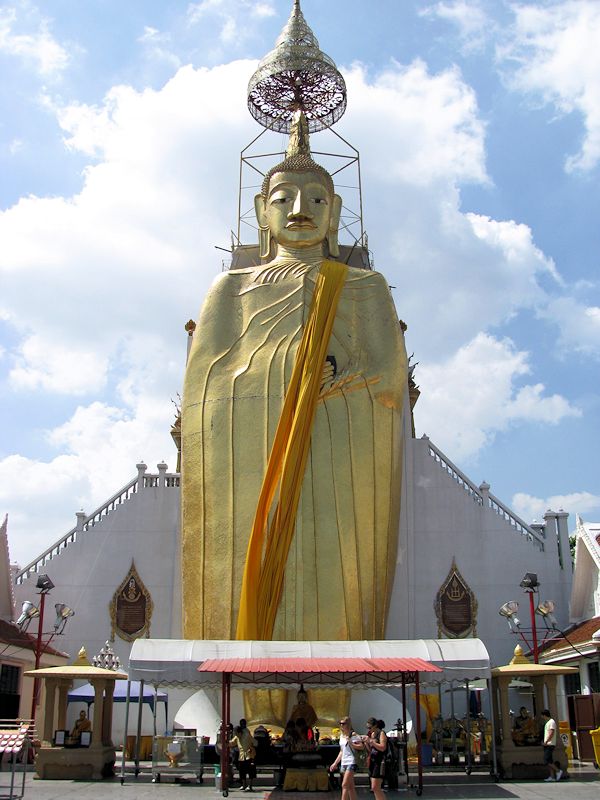
Abb.: Araya Mettaya (พระศรีอริยเมตไตรย), Wat Intharawihan (วัดอินทรวิหาร),
Bangkok, 2009
[Bildquelle: Aimaimyi / Wikipedia. -- GNU FDLIcense]
1933-03-01

Tokyo (Japan): Gründung der 大亜細亜協会 (Greater Asia Association).
1933-03-02

Premiere des Films King Kong (dt.: King Kong und die weiße Frau).
Abb.: Plakat
[Bildquelle: Wikipedia. -- Public domain]
1933-03-04 - 1945-04-12

Franklin D. Roosevelt (1882 - 1945) ist Präsident der USA.
Abb.: Franklin D. Roosevelt
[Bildquelle: DonkeyHotey. -- http://www.flickr.com/photos/donkeyhotey/6721958001/. -- Zugriff am 2012-01-21. --- Creative Commons Lizenz (Namensnennung)]
1933-03-06

Tod von Luang Pu Poo (หลวงปู่ภู จันทสโร, 1830 - 1933), Wat Intravihan (วัดอินทรวิหาร), Bangkok
Abb.: Luang Pu Poo (หลวงปู่ภู จันทสโร)
Abb.: Lage von Wat Intravihan (วัดอินทรวิหาร)
[Bildquelle: OpenStreetMap. -- Creative Commons Lizenz (Namensnennung, share alike)]
1933-03-12
Finanzminister Luang Pradist Manudharm (หลวงประดิษฐ์มนูธรรม = Pridi Phanomyong/ปรีดี พนมยงค์, 1900 - 1983):
"I did not grow up in the city like you Bangkokians, and I know from long residence in the country what the farmers have had to endure in the way of hardships and poverty. Many of my friends in the provinces are very poor. . . . Even Bangkok government officials who go out into the provinces fail to grasp the true situation since they continue to live comfortably, and need never endure the hardships which are the lot of the peasants." [Zitiert in: Landon, Kenneth Perry <1903 - 1993>: The Chinese in Thailand. -- Londondon : Oxford UP, 1941. -- 310 S. ; 23 cm. -- (International Research Series of the Institute of Pacific Relations). -- S. 130]
1933-03-12
Eine Regierungskommission prüft Pridis Wirtschaftsplan. Die Kommission gibt zwei Voten heraus:
- Minderheitsvotum von Phraya Manopakorn Nititada (พระยามโนปกรณ์นิติธาดา, 1884 - 1948), Phraya Songsuradet / Phraya Song (พระยาทรงสุรเดช, 1891/ 1892 - 1944), Phraya Sri Visarn Vacha (Srivisarn Huntrakul) (พระยาศรีวิสารวาจา (หุ่น ฮุนตระกูล), 1896 - 1968), Admiral Phraya Ratchawangsan (Sri Kamonnawin) (พลเรือโท พระยาราชวังสัน (ศรี กมลนาวิน), 1886 - 1940): die vorgeschlagenen Reformen sollen stufenweise ohne Zeitplan verwirklicht werden
- Mehrheitsvotum unter Führung von Pridi und M.C. Sakol Voravarn [หม่อมเจ้า สกล วรวรรณากร วรวรรณ, 1888 - 1952]: Der Wirtschaftplan soll sofort promulgiert werden. Gleichzeitig soll ein National Economic Council geschaffen werden, das die Verwirklichung begleiten soll.
1933-03-15
Pridi legt seine National-Ökonomie in einem Traktat der Öffentlichkeit vor:
หลวงประดิษฐ์มนูธรรม [Luang Pradit Manutham] <1900 - 1983>: เค้าโครงการเศรษฐกิจ : (สมุดปกเหลือง) ["Wirtschaftsprogramm von Luang Pradit Manutham (Gelbes Buch)"]
Ihm wird Kommunismus vorgeworfen.
Abb.: Einbandtitel
"It was a lengthy document with twelve sections and several appendixes. In a preamble Pridi explained how he had borrowed elements from various economic systems in formulating the plan. This was coupled with a warning that many people who talked about economics had never studied the subject and were prepared to condemn certain theories out of prejudice without giving due attention to what they implied. Pridi requested readers of his draft to avoid these pitfalls and consult him if any points were obscure. Still, he claimed that his ideas were set out in simple terms in order to be comprehensible to those who had no university education. The plan began by citing the six principles of the Khana Ratsadorn [คณะราษฎร] and appealing to the humanitarian instincts of readers by describing the poverty and lack of security in the lives of peasant farmers throughout Siam, as well as the urban masses in Bangkok. Consequently Pridi contended that they all wanted to work for the government in return for regular salaries. Hence his basic idea was to make the entire population state employees by introducing a system of social security, details of which were outlined in an appendix to the plan. Pridi claimed that it was not necessary to expropriate the property of the wealthy to finance this scheme. Cooperative societies could be set up to exchange goods for money, which the government would pay back to the people in the form of monthly salaries.
Pridi reasoned that this system would obviate numerous problems which he saw as besetting Siamese economic development. For example, peasant farmers worked only six months in the year between planting and harvesting a single rice crop. If they were salaried employees of the government, cooperative and mechanised methods of agriculture could be introduced. So too could communal living, while surplus labour could be directed into other productive economic enterprises. The government would also be able to eliminate social parasites dependant on the labour of others. However, Pridi stated categorically that his scheme did not imply an intention on the government’s part to destroy the wealthy classes. Those landowners who could never collect the full rents from their tenants, and yet had to pay taxes, would be glad to sell out. Alternatively the government could issue bonds to landowners to the full value of their property and take produce in payment.
Clearly Pridi realised that his proposals would arouse controversy and sought to defend himself in advance. Referring to the belief that peasants cease to care for and cultivate their land once it is transferred to public ownership, he pointed out that already many farmers in Siam did not own the land they tilled. For them there would be no difference between working for a landlord or for the government. Moreover, the government was more likely to introduce improvements such as better irrigation. Pridi also expressly denied that his proposals were intended to reduce everybody to the level of animals, make women common property or abolish family ties. Independent professionals such as doctors, lawyers and professors would be allowed to continue, as would private entrepreneurs if they chose to ignore the advantages of selling out to the government. In conclusion, he stated that if his economic plan was adopted, it would be the dawn of the age of Sri Ariya Mettraya [พระศรีอริยเมตไตรย ] - the next, ideal and final world age as conceived by Theravada Buddhists in South East Asia. The Manifesto of the Khana Ratsadorn ended by stating: "What everyone most desires, the greatest prosperity and happiness called Sri Ariya, will be realised by all the people." "Utopian" has in fact been a term often used in comments on Pridi’s plan."
[Quelle: Stowe, Judith A. <1934 - 2007>: Siam becomes Thailand : a story of intrigue. -- Honolulu : Univ. of Hawaii Pr., 1991. -- 394 S. : Ill. ; 22 cm. -- ISBN 0-8248-1394-4. -- S. 36f.]
Auszug:
"Die wirtschaftliche Unsicherheit. Wer in seinem Herzen Sympathien für seine Mitmenschen hat, wird beim Anblick der Lage der Bauern auf dem Lande wie auch der Armen und Bedürftigen in der Hauptstadt sogleich Mitleid und Erbarmen empfinden. Er wird erkennen, wie schlecht es diesen Menschen geht in Bezug auf Nahrung, Kleidung, Unterkunft usw., welche die Mittel zur Fristung ihres Lebens bilden. Selbst wenn sie heute noch zu essen haben, so ist. doch ungewiss, ob das auch morgen und an den folgenden Tagen noch so sein wird. Ihre Zukunft muss ungewiss bleiben. Führt man sich weiterhin vor Augen, dass der Mensch in seiner physischen Gebrechlichkeit Alter und Krankheit unterworfen ist, (so muss man sich fragen), ob er auch in einem solchen Zustand noch zu essen haben wird, da doch selbst die körperlich Starken schon Mangel leiden."
[Übersetzt von: Rosenberg, Klaus <1943 - 1988>: Sozialkritische Literatur in Thailand : Protest und Anklage in Romanen und Kurzgeschichten eines Landes der Dritten Welt. -- Hamburg : Ges. für Natur- u. Völkerkunde Ostasiens, 1986. -- 360 S. ; 21 cm. -- (Gesellschaft für Natur- und Völkerkunde Ostasiens: Mitteilungen der Gesellschaft für Natur- und Völkerkunde Ostasiens e.V. Hamburg ; Bd. 101). -- S. 23]

Schluss des langen Traktats Pridis über National-Ökonomie:
"When the administration of the economic system by the government shall have brought about the final consummation of the aims, set forth by the People’s Party in their six-point platform, that state of prosperity and felicity which is the laudable desire of every heart and which, in classical language, is called Sriaraya [ศรีอริย] will have dawned. Shall we, who have opened the door of opportunity to the people, now hem and haw and fumble and hesitate to lead them on to the place where they can gather the fruits of the tree of life [กัลปพฤกษ์] ? There at last they will be able to feast on its fruits of happiness and prosperity in fulfillment of the Buddhist prophecy to be found in the story of the religion of Araya Mettaya [พระศรีอริยเมตไตรย] . According to this prophecy every act of devotion on the part of faithful followers of religion brings that golden age a little nearer. It is a common saying among the people that an oath made in court and honourably kept, in other words true witnessing, brings us closer to the age of Araya Mettaya. Religious ceremonies properly observed and in fact all acts of honesty and integrity likewise bring nearer the dawn of that era. In this plan we have a system by which we can press forward to this golden age. And yet there are some people who hesitate, who draw back so violently that one would suppose they contemplated a return to the age of unenlightenment of 2,475 years ago when Buddha had not yet come." [Übersetzung: Landon (1939), S. 292f.]

Rama VII. antwortet Pridi in einem สมุดปกขาว (Weißes Buch).
"Dubbed the Samud pokkhao [สมุดปกขาว] (White-covered book), the royal critique followed the well-worn but effective Vajiravudhian style of antiradicalism by castigating Pridi’s Economic Plan as an authoritarian and communistic (three times) copy of the alien Russian Stalinist original (thirty-two times) that would enslave the nation (pen thas) [เป็นทาส] and turn it disastrously un-Thai (eleven times) if ever implemented in full. For example: ] will become thas-ness [slavery] [ความเป็นทาส] because, as has happened in Russia where the same method of insurance was used, the people there have to insure welfare with their freedom and submit to the government as its slaves."Since this is the same as the economic plan used in Russia, as has been said, if our government follows it through, then that will amount to our government helping the Third International [Коммунистический интернационал - Коминтерн, 3-й Интернационал], which aims at changing the world into communism, achieve its aim easily. Because, undoubtedly, for us to carry out this plan will eventually land us in communism for sure. Communism here entails a communist economy, not the so-called government-arranged community of women. Be that as it may, Thailand shall thence become the second communist country in the world after Russia...
"But one important point that can be clearly seen without doubt is that this plan is certainly the same as the one being used by Russia. As to who copied whom I don’t know. Whether Stalin [Ио́сиф Виссарио́нович Ста́лин, 1878 - 1953] copied Luang Pradist [Pridi] [หลวงประดิษฐ์], or Luang Pradist copied Stalin can’t be answered. The only answer that can be given is that these two plans are completely the same right down to the minute details about the methods to be used and their forms. The only difference is that "Russia" is changed to "Thailand" or "Thailand" to "Russia. "...
"Probably, Thainess [ความเป็นไทย
"Can it be said that the aim of this plan is to prevent people from becoming beasts when it will turn them into slaves of pre-King Chulalongkorn’s Abolition of Slavery times? And instead of becoming so- called "royal servants, " it is likelier that they will turn into state slaves... "
Artfully refuting Pridi’s all-too-frequent conjuration of the Sri Arya myth [พระศรีอริยเมตไตรย], the King pointed out that, in accordance with the original Buddhist tale, the Age of Sri Arya would arrive only in the year B. E. 5000. Since the time then was just B. E. 2475, why the hurry? Rather than deliver Siam to the Paradise of Sri Arya, Pridi’s untimely plan would rush her into the Sri Arya’s Inferno (Aweji Sri Arya) [อเวจีศรีอริย] instead! "
[Quelle: Kasian Tejapira [เกษียร เตชะพีระ] <1957 - >: Commodifying Marxism : the formation of modern Thai radical culture, 1927-1958. -- Kyoto : Kyoto Univ. Pr., 2001. -- 390 S. : Ill. ; 23 cm. -- (Kyoto area studies on Asia ; 3). -- ISBN 1876843985. -- Revision of the author's thesis (doctoral) -- Cornell University, 1992. -- S. 37]
1973 erscheinen die Bemerkungen von Rama VII. zu dem Buch Pridis:
สิริ เปรมจิตต์ [Siri Premchit]: พระบาทสมเด็จพระปกเกล้าฯ ทรงโต้แย้ง เค้าโครงการเศรษฐกิจ ของนายปรีดี พนมยงค์ [Die Argumente von König Phra Pok Klao (= Prajadhipok) zum Wirtschaftsprogramm von Prodi Banomyong]. -- : จิตตสอาด ศรียงค์, 2516 [1973]. .. 216 S. : 19cm.
Abb.: Einbandtitel
1933-03-27

Japan verlässt den Völkerbund. Dieser hatte am 24. März den weitgehenden Rückzug Japans aus der Mandschurei gefordert. Siam enthält sich als einziger Staat der Stimme. Dies verbessert das Verhältnis Siams mit Japan schlagartig.
1933-03-28
Pridi's Wirtschaftsplan vom 15. März wird im Kabinett abgelehnt: 11 Nein, 3 Ja, 5 Enthaltungen.
1933-03-28
Anlässlich seines 25. Geburtstags und des 50. Geburtstags seines verstorbenen Vaters, Chakrabongse Bhuvanath (จักรพงษ์ภูวนาถ, 1883 – 1920), spendet Prinz Chula Chakrabongse (จุลจักรพงษ์, 1908 – 1963) an verschiedene Institutionen insgesamt 200.000 Baht.
1933-03-30

United Airlines nimmt den Flugbetrieb mit der Boeing 247 auf, einem der ersten modernen Verkehrsflugzeuge.
Abb.: Boeing 247 der United Airlines mit Stewardessen
[Bildquelel: SDASM Archives. -- http://www.flickr.com/photos/sdasmarchives/4589671627/. -- Zugriff am 2013-09-19. -- "Keine Urheberrechtsbeschränkungen bekannt"]
"Die Boeing 247 war ein mittleres US-amerikanisches Verkehrsflugzeug der 1930er-Jahre des Flugzeugherstellers Boeing. Das ab Mitte 1932 gebaute zweimotorige Flugzeug gilt als eines der ersten modernen Flugzeuge seiner Art und bot neben der dreiköpfigen Besatzung Platz für 10 Passagiere. Die B-247 war neben einem Autopiloten auch mit einer Enteisungsanlage, einem Einziehfahrwerk sowie Verstellpropellern (bei der B-247D) und mit verkleideten und an der Tragflügelvorderkante angebrachten Motoren ausgerüstet. Der Rumpf entstand aus vier Segmenten aus Duraluminium, die mit Bolzen zusammengefügt und mit Aluminiumblechen verkleidet wurden. Die ebenfalls aus Duraluminium bestehenden Tragflächen waren eine moderne Konstruktion aus Holmen und Rippen, deren Mittelstück integral mit dem Rumpf verbunden war und die Motorbefestigung für die Motoren vom Typ Pratt & Whitney Wasp S1D1 (P & W R-1340) trug. Die äußeren Flügelsegmente enthielten jeweils einen Kraftstofftank. Im Bug gab es ein Gepäckfach, das durch eine abklappbare Nasenspitze erreichbar war." [Quelle: http://de.wikipedia.org/wiki/Boeing_247. -- Zugriff am 2013-09-19]
1933-03-31
Gründung des Royal Institute of Thailand (ราชบัณฑิตยสถาน).
Abb.: Ursprüngliches Gebäude des Royal Institute of Thailand - ราชบัณฑิตยสถาน, im Komplex des Großen Palastes (พระบรมมหาราชวัง)
[Bildquelle: Rikker Dockum / Wikipedia. -- Creative Commons Lizenz (Namensnennung, share alike)]
"Das Königliche Institut Thailands (Thai: ราชบัณฑิตยสถาน, sprich: [râːt-ʧa-ban-dìt-(ta-)já-sa-tʰăːn]) ist eine Wissenschaftsakademie der thailändischen Regierung. Gründung
Das Königliche Institut Thailands wurde am 31. März 1933 durch die Royal Institute Act des thailändischen Kongresses (สภาผู้แทนราษฎร) gegründet. Dahinter stand der Wunsch, nach dem politischen Umbruch von 1932 (Ende der absoluten Monarchie) in Thailand eine eigene Einrichtung zu schaffen, in der thailändische Experten aus allen akademischen Wissensgebieten zusammenkommen, um im Austausch untereinander und mit westlichen Wissenschaftlern zu dem Ziel zu gelangen, eine vom Westen unabhängige, eigene thailändische akademische Landschaft der Forschung und Lehre aufzubauen, durch die Wissen an das Volk und Schüler und Studierende im Lande weitergegeben werden kann.
Das Königliche Institut sollte das von König Prajadhipok (Rama VII.) am 19. April 1926 gegründete Königliche Konzil (ราชบณฑิตยสภา) ersetzen. Das Königliche Institut wurde bei der Gründung personell völlig neu bestückt, während die Mitglieder des nun aufgelösten Königlichen Konzils in das neu gegründete Fine Arts Department (กรมศิลปากร) übernommen wurden.
ArbeitsfelderVerschiedene Komitees des Königlichen Instituts, ca. 44-50 an der Zahl, erarbeiten Fachterminologie, Wörterbücher, Enzyklopädien und ein Ortsverzeichnis und betreiben Sprachplanung. Des Weiteren sorgt das Königliche Institut für die Übersetzung und Herausgabe diverser Sachbücher.
Quellen
- Hochglanzfaltblatt (Thai/Englisch/Französisch) des Königlichen Instituts von 2004.
- Artikel von Chamnong Thongprasoet (1991) über Prinz Wan: "พระผู้ทรงจุดประทีปให้ราชบัณฑิตยสถาน", in den Anthologien zum 100. und zum 110. Geburtstag von Prinz Wan (siehe Quellen dort)."
[Quelle: http://de.wikipedia.org/wiki/K%C3%B6nigliches_Institut_Thailands. -- Zugriff am 2011-11-12]
ausführlich: http://www.payer.de/thailandchronik/ressourcen.htm
Thai politics : extracts and documents 1932 - 1957 / ed. by Thak Chaloemtirana <ทักษ์ เฉลิมเตียรณ>. -- Bangkok : Social Science Ass., 1978. -- 884 S. ; 25 cm.
Landon, Kenneth Perry <1903 - 1993>: Siam in transition : a brief survey of cultural trends in the five years since the revolution of 1932. -- Chicago : Univ. of Chicago Press, 1939. -- 328 S. ; 24 cm.
Thompson, Virgina <1903 - 1990>: Thailand the new Siam. -- New York : Macmillan, 1941. -- 865 S. : 24 cm.
Thawatt Mokarapong [ธวัช มกรพงศ์] <1932 - >: History of the Thai revolution : a study in political behaviour. -- Bangkok : Chalermnit, 1972. -- 251 S. : 21 cm.
Phongpaichit, Pasuk <ผาสุก พงษ์ไพจิตร, 1946 - > ; Baker, Chris <1948 - >: Thailand : economy and politics. -- Selangor : Oxford Univ. Pr., 1995. -- 449 S. ; 23 cm. -- ISBN 983-56-0024-4. -- Beste Geschichte des modernen Thailand.
Ingram, James C.: Economic change in Thailand 1850 - 1870. -- Stanford : Stanford Univ. Pr., 1971. -- 352 S. ; 23 cm. -- "A new edition of Economic change in Thailand since 1850 with two new chapters on developments since 1950". -- Grundlegend.
Akira, Suehiro [末廣昭] <1951 - >: Capital accumulation in Thailand 1855 - 1985. -- Tokyo : Centre for East Asian Cultural Studies, ©1989. -- 427 S. ; 23 cm. -- ISBN 4896561058. -- Grundlegend.
Skinner, William <1925 - 2008>: Chinese society in Thailand : an analytical history. -- Ithaca, NY : Cornell Univ. Press, 1957. -- 459 S. ; 24 cm. -- Grundlegend.
Mitchell, B. R. (Brian R.): International historical statistics : Africa and Asia. -- London : Macmillan, 1982. -- 761 S. ; 28 cm. -- ISBN 0-333-3163-0
Thailand in figures 2000 - 2001. -- Bangkok : Alpha, 2000. -- 934 S. : Ill. ; 30 cm. -- ISBN 974-87738-1-7
Thompson, Virgina <1903 - 1990> ; Adloff, Richard: The left wing in Southeast Asia. -- New York : Sloane, 1950. -- Darin: Thailand (Siam). -- S. 51 - 75